|

HOME |
ABOUT | INDEX |
NEWS |
FACEBOOK |
CONTACT
MILITARY
Veterans |
Troops | Soldiers | Sailors | Pilots
Veterans Crisis
Line
800-273-8255
Honoring Our
LGBTQ Military Members
Serving
Proudly Under the Banner of Freedom
In honoring the brave souls who have served our nation,
we extend our gratitude not only for their courage on
the battlefield but also for their unwavering dedication
to defending the values of freedom and equality. On
Veterans Day and Memorial Day, we pay tribute to the
LGBTQ military members who have stood tall in the face
of adversity, fighting not only for their country but
also for the right to serve openly and proudly.
These individuals have faced unique challenges,
navigating a path often fraught with discrimination and
prejudice. Yet, they have shown remarkable resilience,
refusing to let their identities hinder their commitment
to duty and honor. Their sacrifices, like those of their
fellow servicemen and women, are woven into the fabric
of our nation's history, a testament to the diversity
and strength of our armed forces.

On Veterans Day...
we salute the LGBTQ veterans who have served with
distinction, from the battlefields of World War II to
the jungles of Vietnam, from the hills of Korea to the
deserts of Iraq and Afghanistan. Their bravery knows no
bounds, and their contributions to our nation's defense
are immeasurable.
On Memorial Day...
we remember those LGBTQ service members who made the
ultimate sacrifice, laying down their lives in defense
of freedom. Their names may not always be spoken, their
stories may not always be told, but their legacy lives
on in the freedoms we cherish and the liberties we hold
dear.
As we gather to honor all who have served, let us never
forget the LGBTQ military members who have answered the
call of duty with courage and conviction. Their service
reminds us that the true strength of our nation lies in
its diversity, and that every individual, regardless of
who they are or who they love, has the right to stand
tall and serve proudly under the banner of freedom.
Sarah McBride Defends Transgender Troops
on House Floor as Pentagon Expels Committed Patriots
Harvey Milk is an Icon... Pete Hegseth is
an Idiot
Modern Military Association of America
Ret. Gen. Stanley McChrystal: Today's Military Should be
Diverse
Hegseth Attacks Transgender Service Members in Speech
Federal Judge Blocks Trump Transgender Military Ban
Trump Fires First Female US Coast Guard Chief Linda
Fagan Due to Excessive Diversity Focus
Trump Signs Executive Order Barring
Transgender People From Military Service
Colonel
Bree Fram
Trans
Career Military Officer Removed From Duty
One of the
United States’ highest-ranked trans military officers
has shared how she has been “grieving” her future since
being put on leave following the Trump administration’s
transgender military ban.
Space Force Colonel Bree Fram, who had served in the
military for 23 years, said in a speech at the San Diego
LGBTQ Community Center: “I absolutely believed in what
the military stood for, believed in my oath to the
Constitution, and I worked on amazing things with
incredible people. I loved what I did.”
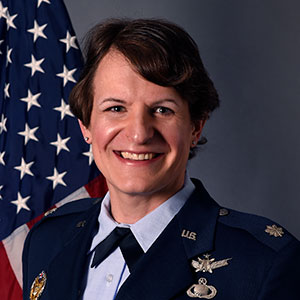
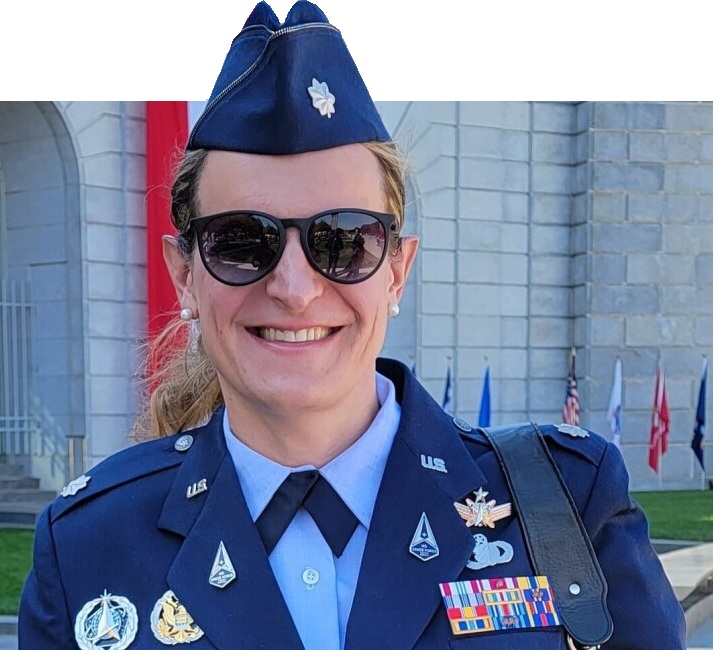
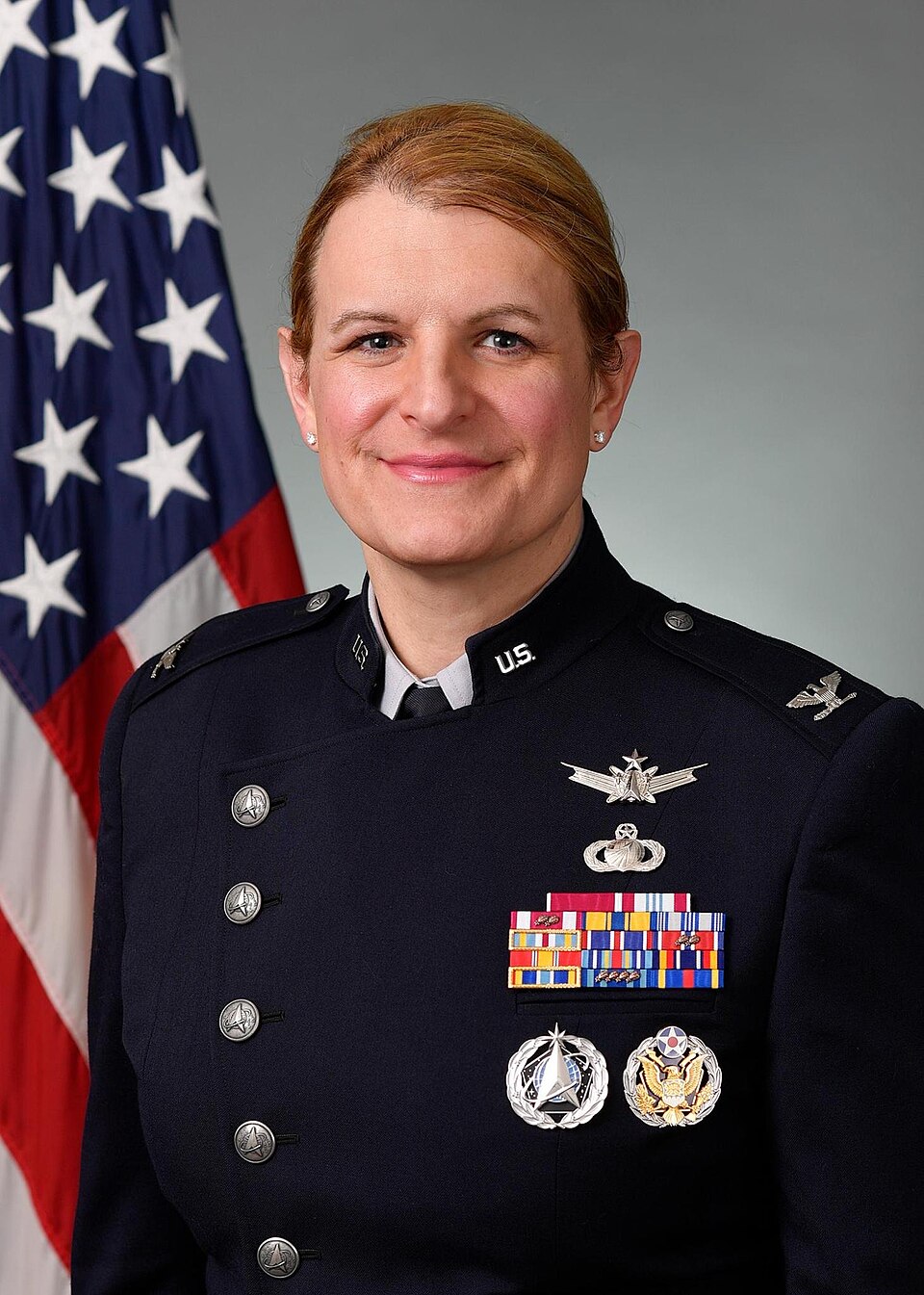
Bree
Fram: Biographical Notes
Trans Colonel Faces Removal After Decades of Service:
Absolutely Heartbroken
Military Colonel Reacts to SCOTUS Allowing Transgender
Military Ban
How a Trans Colonel is Embracing Her Life in the Space
Force
Bree Fram:
Facebook Page
Speaking
of trans military members, she said: “We have been part
of the military since the Revolution. It’s really that
competence first that earns people’s trust in the
military. And the trans folks showed that, everywhere,
every rank, every service, all around the world. And
that mattered.”
Colonel Bree Fram gave her speech at the center's LGBTQ
Veterans Wall of Honor ceremony in a personal capacity
as she was not allowed to do so in uniform. She also
shared that the ban hasn’t stopped her from serving her
country. “That oath has no expiration date and we get to
continue defending democracy in different ways.”
Harvey Milk is an Icon... Pete Hegseth is
an Idiot
Sarah McBride Defends Transgender Troops
on House Floor as Pentagon Expels Committed Patriots
Ret. Gen. Stanley McChrystal: Today's Military Should be
Diverse
Hegseth Attacks Transgender Service Members in Speech
Federal Judge Blocks Trump Transgender Military Ban
Modern Military Association of America
Trump Fires First Female US Coast Guard Chief Linda
Fagan Due to Excessive Diversity Focus
Policies Concerning LGBTQ Members of the Military
US House Passes Defense Spending Bill
With Anti-Trans Provision
Rest in Peace: Veteran Comes Out as Gay in His Own Obituary
LGBTQ Vets Discharged Dishonorably for Sexual Orientation to get Full Benefits
LGBTQ Service Members: Out and Proud
TED Talk: Gays in the Military
What It's Like to Be Gay in the Military
Hegseth Delivers
Tough Frat Boy Speech to US Military Leaders
"No more identity months, DEI offices, dudes in
dresses. We are done with that shit."
-Pete Hegseth, Sec of Defense (War)
In Pete Hegseth's highly sexist and homophobic message,
he reinstates pre-2015 combat-fitness standards, imposes
twice-yearly physical testing, and eliminates
facial-hair and gender-expression accommodations that
had previously covered medical and religious needs.
In the Quantico speech, Hegseth declared the end of the
Department of Defense and announced a return to the
“Department of War,” a rebranding he said would “restore
clarity of mission.” He accused prior administrations of
weakening the military through diversity and inclusion
efforts, which he described as “toxic distractions.”
“No more identity months, DEI offices, dudes in dresses,
or climate-change worship,” he told the assembled
generals and admirals. “We are done with that shit.”
The 45-minute speech blended moral revivalism with
combat rhetoric, invoking “peace through strength” while
condemning equality efforts as a “cancer.” “The era of
politically correct, overly sensitive,
don’t-hurt-anyone’s-feelings leadership ends right now,”
Hegseth said. “Standards must be uniform, gender
neutral, and high.”
He announced new grooming and fitness mandates,
declaring, “The era of unprofessional appearance is over
— no more beardos.” His directives require every member
of the armed forces, from privates to four-stars, to
perform daily physical training and meet rigid
body-composition requirements. “If the Secretary of War
can do regular hard PT, so can every member of our joint
force,” he said. “If you want a beard, you can join
Special Forces. If not, then shave.”

Pete Hegseth Mandates
All Military Service Members Watch his Speech
Hegseth Attacks Transgender Service members in Speech
Pete Hegseth and Kash Patel Start Frightening Return of
the Lavender Scare
Pete Hegseth's Full Speech
On removing "woke" ideology...
Hegseth has expressed his intent to eliminate what he
calls "woke" ideology from the military. He stated that
the military had become the "Woke Department" but that
would no longer be the case. He asserted that his
administration has worked to remove "social justice,
politically correct and toxic ideological garbage,"
including "identity months, DEI offices," and "climate
change worship". Hegseth also commented on the phrase
"diversity is our strength," calling it "the single
dumbest phrase in military history" and stating that
unity and shared purpose are the military's strength.
On
military standards and fitness...
Hegseth has emphasized the importance of maintaining
high standards for troops. He mentioned that it is
unacceptable to see "fat troops" and "fat generals and
admirals". He also stated that individuals would be
judged by merit and commitment to the team and mission.
Additionally, Hegseth indicated a return to stricter
appearance standards, stating, "No more beards, long
hair, superficial individual expression. We're going to
cut our hair, shave our beards and adhere to standards".
On
combat roles and women...
Hegseth announced a change regarding combat roles,
stating they will return to the "highest male standard
only" with gender-neutral scoring on combat fitness
tests based on male standards. He clarified that if
women can meet these standards, it is acceptable, but if
not, then that is also the case, emphasizing that "This
is combat. This is life or death".
Policies Concerning LGBTQ Members of the Military
US House Passes Defense Spending Bill
With Anti-Trans Provision
Rest in Peace: Veteran Comes Out as Gay in His Own Obituary
LGBTQ Vets Discharged Dishonorably for Sexual Orientation to get Full Benefits
LGBTQ Service Members: Out and Proud
TED Talk: Gays in the Military
What It's Like to Be Gay in the Military
Pete Hegseth
Hurls Vile Insult at Trans Service Members During
Keynote Speech
People applauded him for insulting trans service
members...
Secretary of Defense Pete Hegseth insulted trans women
during his keynote address at this year’s Special
Operations Forces Week. “Everything starts and ends with
warriors, from training to the battlefield,” he said.
“We are leaving wokeness and weakness behind. No more
pronouns. No more climate change obsession. No more
emergency vaccine mandates. No more dudes in dresses,
we’re done with that shit.” The crowd laughed and then
applauded.


The speech took place on May 6, 2025, the same day the
Supreme Court said the administration can implement the
transgender military ban while the lawsuits against the
policy proceed. Since the lawsuits could take years,
there are an estimated 8,000 to 15,000 trans service
members who could be kicked out of the military due to
this Supreme Court decision.
In reality, a 2016 study by the RAND Corporation found
that trans people do not harm military readiness and
that foreign militaries have successfully enlisted trans
military service members without any negative effects on
effectiveness, readiness, or unit cohesion. The study
also found that the cost of trans-related medical care
is exceedingly small relative to the Department of
Defense’s overall healthcare costs.
[Source: Molly Sprayregen, LGBTQ Nation, May 2025]
Harvey Milk is an Icon... Pete Hegseth is
an Idiot
Sarah McBride Defends Transgender Troops
on House Floor as Pentagon Expels Committed Patriots
Ret. Gen. Stanley McChrystal: Today's Military Should be
Diverse
Hegseth Attacks Transgender Service Members in Speech
Federal Judge Blocks Trump Transgender Military Ban
Modern Military Association of America
Trump Fires First Female US Coast Guard Chief Linda
Fagan Due to Excessive Diversity Focus
Policies Concerning LGBTQ Members of the Military
US House Passes Defense Spending Bill
With Anti-Trans Provision
Rest in Peace: Veteran Comes Out as Gay in His Own Obituary
LGBTQ Vets Discharged Dishonorably for Sexual Orientation to get Full Benefits
LGBTQ Service Members: Out and Proud
TED Talk: Gays in the Military
What It's Like to Be Gay in the Military
US House Passes
Defense Spending Bill With Anti-Trans Provision
Defense
Bill Banning Trans Care for Minors Could Put Some
Families in Survival Mode...
One Democratic lawmaker estimated 4,000
transgender minors currently within the military health
system could lose care due to the measure...
The US
House of Representatives passed a massive defense
spending bill In Dec 2024 with a provision that bars the
military’s health care program from covering
transition-related care for minors. If it passes, some
families said it would be devastating and could force
them out of the military.
The National Defense Authorization Act, a must-pass $895
billion bill, sets Pentagon and defense policies for the
next year. Speaker Mike Johnson, R-La., pushed to add
the new provision regarding trans care, which states
that “affirming hormone therapy, puberty blockers, and
other medical interventions for the treatment of gender
dysphoria that could result in sterilization may not be
provided to a child under the age of 18” under Tricare,
the military’s health program.


Hegseth Attacks Transgender Service Members in Speech
US House Passes Defense Spending Bill
With Anti-Trans Provision
Defense Bill Banning Trans Care for Minors Could Put
Some Families in Survival Mode
US House Approves $895B Defense Bill With Military Pay
Raise and Ban on Transgender Care for Minors
Families Consider Leaving Military After House Votes Yes
on Anti-Trans Spending Bill
Rep. Sarah McBride: On Purging Trans Servicemembers from
the Military
The bill passed the House 281-140, with 200 Republicans
and 81 Democrats voting yes, while 124 Democrats and 16
Republicans voted no. The Senate will vote on the bill
next week, and then it will be sent to President Joe
Biden — who would need to veto the entire package if he
wanted to block the trans care element. If the NDAA is
signed into law, it would mark one of the first times
Congress has aggressively attempted to pass a federal
statute targeting trans people.
Johnson called the bill’s passage in the House “an
important win for our troops,” noting that it would
provide pay increases to about half of enlisted service
members and improve military housing, among other
investments. “We also believe it’s important to refocus
the Pentagon on military lethality, not radical woke
ideology,” he said in a statement. “This legislation
permanently bans transgender treatment for minors,
prohibits critical race theory in military academies,
ends the DEI bureaucracy, and combats antisemitism.”
However, some military families with trans children
disagree that the provision regarding trans care will
improve the military. One active duty member of the Air
Force, who has served for more than two decades and has
a trans daughter who is receiving treatment for gender
dysphoria through Tricare, said the bill sends a “mixed
message,” because it could help some military families
while harming others.
“The reason why the military has some of the amazing
benefits that we do is so that when we are called to
action or we are called to war, we can focus entirely on
the mission and the task at hand, because we know that
our family and our home life is secure and safe,” said
the service member, who requested anonymity out of fear
of facing repercussions at work for speaking to the
press. “If you want to ensure we remain the world’s most
effective fighting force, you should not take away care
for our military members and their dependents.”


Sarah McBride Defends Transgender Troops
on House Floor as Pentagon Expels Committed Patriots
Ret. Gen. Stanley McChrystal: Today's Military Should be
Diverse
Hegseth Attacks Transgender Service Members in Speech
US House Passes Defense Spending Bill
With Anti-Trans Provision
Defense Bill Banning Trans Care for Minors Could Put
Some Families in Survival Mode
US House Approves $895B Defense Bill With Military Pay
Raise and Ban on Transgender Care for Minors
Families Consider Leaving Military After House Votes Yes
on Anti-Trans Spending Bill
The service member and his spouse said their teenage
daughter came out to them about four years ago. About
two years ago, she underwent at least six months of
psychological evaluations and received other doctors’
opinions before beginning hormone therapy. “Once she was
able to receive the gender-affirming care, it was like
the puzzle pieces fell into place,” the service member’s
spouse said. “We could see her, she was happy, her
grades got better, she started to make so many more
friends. It was beautiful. It was a veil that got
removed, and then you could fully see your kid and
celebrate them.”
The service member said that if the NDAA passes with the
provision regarding trans care for minors, he would
consider finding supplemental insurance or paying out of
pocket for his daughter’s care, but that doing so would
strain his family’s budget. He said the out-of-pocket
costs would vary depending on whether they can get
supplemental insurance. The average cost of estrogen
without insurance can fall between $20 to $200 per month
depending on the dose and delivery method.
The service member said that the restriction would
definitely affect his decision to continue to serve. “I
have a strong desire and propensity to continue to serve
and to continue to give back to the military, but if I
lose access to care for my family, my family’s got to
come first,” he said.


Hegseth Attacks Transgender Service Members in Speech
US House Passes Defense Spending Bill
With Anti-Trans Provision
Defense Bill Banning Trans Care for Minors Could Put
Some Families in Survival Mode
US House Approves $895B Defense Bill With Military Pay
Raise and Ban on Transgender Care for Minors
Families Consider Leaving Military After House Votes Yes
on Anti-Trans Spending Bill
Rep. Sarah McBride: On Purging Trans Servicemembers from
the Military
It’s unclear how many families would be affected by the
provision. But Rep. Adam Smith, D-Wash., the former
Armed Services chairman who is now the panel’s ranking
member, said on the House floor that there are about
4,000 minors currently within the military health system
whose care would be taken away by the restriction.
“Blanketly denying health care to people who need it —
just because of a biased notion against transgender
people — is wrong,” Smith said in a statement. “The
inclusion of this harmful provision puts the lives of
children at risk and may force thousands of service
members to make the choice of continuing their military
service or leaving to ensure their child can get the
health care they need.”
Cathy Marcello, the deputy director of the Modern
Military Association of America, an organization that
advocates for LGBTQ members of the military and
veterans, said hundreds of the families the organization
supports are frightened by the potential restriction.
She added that Modern Military estimates that there are
currently about 10,000 trans youth between 6 and 22 with
parents who are in the military, based on the Defense
Department’s estimate that there are 1.6 million
military children.
“Families are deciding right now if they will be able to
afford care on their own, or if they can get out, or if
they should live apart,” Marcello said. She added that
95% of the group’s membership reported altering their
military career in some way because of state laws
targeting LGBTQ people, according to a recent small
internal poll of about 300 member families. She said the
Tricare restriction would further affect where service
members can live and how long they serve.
“Military families with trans kids have been serving for
decades and it’s never been an issue,” she said. “To say
to these many thousands of families that your sacrifice
isn’t good enough, that your multiple combat deployments
aren’t good enough and we don’t want you is
unconscionable.”
[Source: Jo Yurcaba, NBC News, Dec 2024]
Ret. Gen. Stanley McChrystal: Today's Military Should be
Diverse
Hegseth Attacks Transgender Service Members in Speech
Sarah McBride Defends Transgender Troops
on House Floor as Pentagon Expels Committed Patriots
Federal Judge Blocks Trump Transgender Military Ban
Modern Military Association of America
Two Gay Soldiers Secretly Fell in Love in the ‘70s
Trump Fires First Female US Coast Guard Chief Linda
Fagan Due to Excessive Diversity Focus
Policies Concerning LGBTQ Members of the Military
US House Passes Defense Spending Bill
With Anti-Trans Provision
Rest in Peace: Veteran Comes Out as Gay in His Own Obituary
LGBTQ Vets Discharged Dishonorably for Sexual Orientation to get Full Benefits
LGBTQ Service Members: Out and Proud
TED Talk: Gays in the Military
What It's Like to Be Gay in the Military
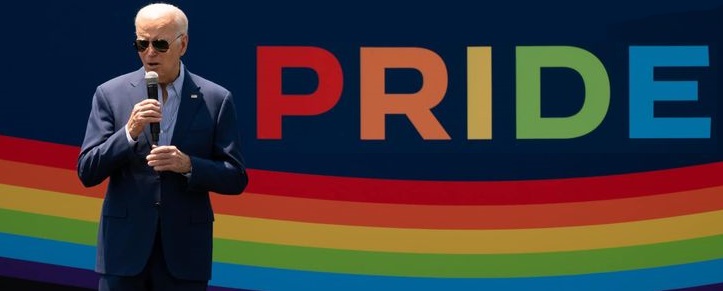
Presidential
Pardon for LGBTQ Military Members
In June
2024, President Joe Biden pardoned LGBTQ service members
convicted of wrongdoing because of their same-sex
orientation...
“Today, I am righting an historic wrong by using my
clemency authority to pardon many former service members
who were convicted simply for being themselves. Our
nation’s service members stand on the frontlines of
freedom, and risk their lives in order to defend our
country. Despite their courage and great sacrifice,
thousands of LGBTQ service members were forced out of
the military because of their sexual orientation or
gender identity. Some of these patriotic Americans were
subject to court-martial, and have carried the burden of
this great injustice for decades.”
Biden Reverses Trump's Transgender Military Ban
Family Member Speaks Out After Military Veteran Reveals in Obituary He is Gay
Why We Need Trans People in the US Military
Jody Davis: Veteran,
Nurse, Transgender
Marine Corps Celebrates Pride, Puts Down Homophobes
President Biden Overturns
Ban on Transgender Military Personnel
US Navy Launches
New Ship Named for Harvey Milk
The US
Navy has launched a ship named after a gay rights
activist forced to resign from the service because of
his sexuality in the 1950s. The USNS Harvey Milk was
launched in San Diego in November 2021 in a service
attended by Navy Secretary Carlos Del Toro and Milk's
nephew, Stuart.
It is one of six new ships to be named after famed US
civil rights leaders. Others include former Chief
Justice Earl Warren and slain presidential candidate
Robert Kennedy.
Milk served as a diving officer and Lieutenant aboard
the submarine rescue ship USS Kittiwake during the
Korean War. But he was forced out of the service
following two weeks of interrogation about his sexuality
in 1955.
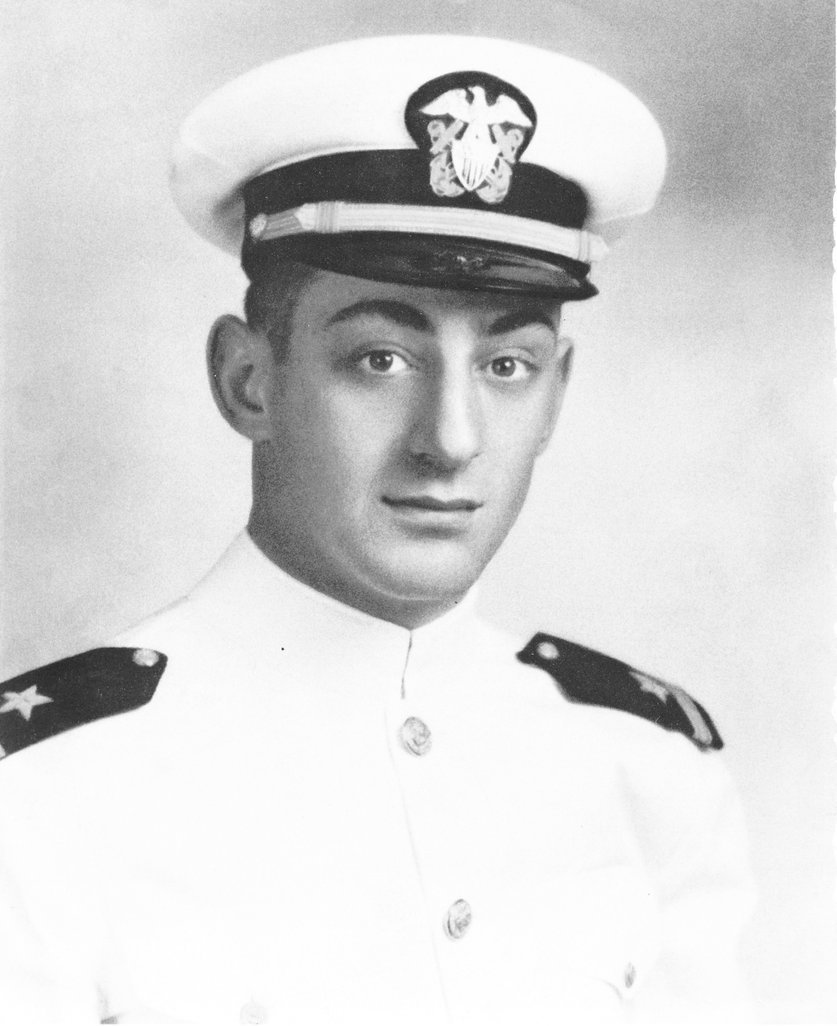

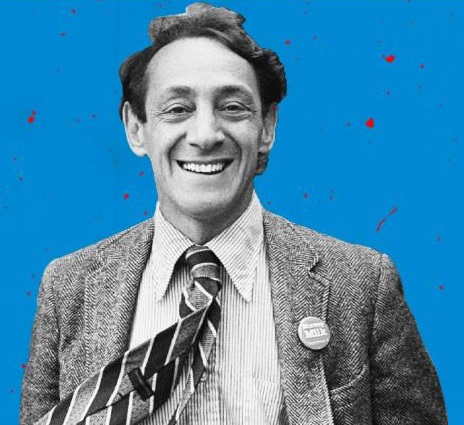
BBC: US Navy Launches Ship Named for Gay Rights Leader
Harvey Milk
NPR: US Navy Christens Ship Named After Slain Gay Rights
Leader Harvey Milk
Advocate: US Navy Launches Ship Honoring
Harvey Milk
USA Today: Navy Christens Ship USNS Harvey Milk, Named
After Gay Rights Activist
CNN: US Navy Launches Ship Named for Gay Rights Activist
Harvey Milk
LGBTQ Nation: Navy Officially Launches Ship Named After
Gay Trailblazer Harvey Milk
NBC: Navy Launches Ship Named for Gay Rights Leader
Harvey Milk
Video: Navy Launches Ship Named for Pioneering Gay San
Francisco Leader Harvey Milk
He later became one of America's first openly gay
politicians, elected in 1977 to the San Francisco Board
of Supervisors. But a year later he was shot and killed
by Dan White, a former city supervisor with whom he had
frequently clashed.
Speaking at the ceremony, Secretary Del Toro said that
it had been wrong that Milk had been forced to "mask
that very important part of his life" during his time in
the Navy. "For far too long, sailors like Lt. Milk were
forced into the shadows or, worse yet, forced out of our
beloved Navy," Del Toro said. "That injustice is part of
our Navy history, but so is the perseverance of all who
continue to serve in the face of injustice."
When the Obama administration first announced its
intention to name a ship after Milk in 2016 some
expressed opposition to the move. They suggested that
Milk would have disapproved of lending his name to a
Navy ship given his well known opposition to the Vietnam
War.
[Source:
BBC, November 2021]
Modern Military Association of America
Policies Concerning LGBTQ Members of the Military
Rest in Peace: Veteran Comes Out as Gay in His Own Obituary
LGBTQ Vets Discharged Dishonorably for Sexual Orientation to get Full Benefits
LGBTQ Service Members: Out and Proud
TED Talk: Gays in the Military
What It's Like to Be Gay in the Military
Family Member Speaks Out After Military Veteran Reveals in Obituary He is Gay
Biden Reverses Trump's Transgender Military Ban
Why We Need Trans People in the US Military
Jody Davis: Veteran,
Nurse, Transgender
Marine Corps Celebrates Pride, Puts Down Homophobes
President Biden Overturns
Ban on Transgender Military Personnel
Dr. Rachel
Levine Is Now First Trans 4-Star Admiral in US History
She is a highly accomplished pediatrician
The US Department of Health and Human Services (HHS)
announced in Oct 2021 that the nation’s first openly
transgender four-star officer across any of the eight
uniformed services of the United States.
Admiral Rachel Levine, who serves as the HHS Assistant
Secretary for Health and head of the US Public Health
Service (USPHS) Commissioned Corps, was ceremonially
sworn in as a four-star admiral. Admiral Levine now
serves as the highest-ranking official in the USPHS
Commissioned Corps and its first-ever female four-star
admiral. Admiral Levine will lead 6,000 Public Health
Service officers who are dedicated to serving our
nation’s most underserved and vulnerable populations.
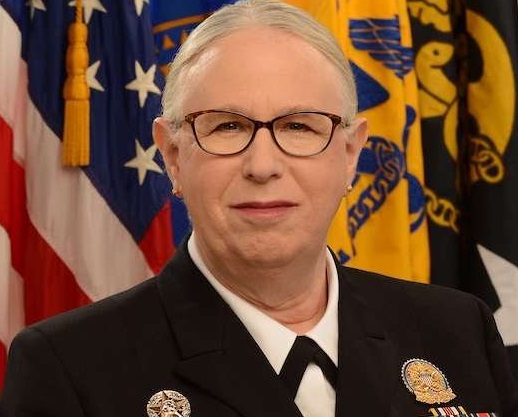
Call Her Admiral Rachel Levine Now
Dr. Rachel Levine Is Now First Trans 4-Star Admiral in
US History
Rachel Levine, Nation’s Highest-Ranking Openly
Transgender Official, Sworn in as Four-Star Admiral
HHS Secretary Xavier Becerra said that making Levine an
admiral is a proud moment for HHS. “She is a highly
accomplished pediatrician who helps drive our agency’s
agenda to boost health access and equity and to
strengthen behavioral health,” Secretary Becerra
explained. “She is a cherished and critical partner in
our work to build a healthier America.
In response to becoming a four-star officer, Levine
said, “This is a momentous occasion, and I am both
humbled and pleased to take this role for the impact I
can make, and for the historic nature of what it
symbolizes. May this appointment be the first of many
like it as we create a more inclusive future.”
In a recent interview, Levine provided an update to all
the work she’s been doing during the first six months of
her tenure as Assistant Secretary of Health and Human
Services. “I’m very much enjoying the job. We have a
fantastic staff, and Secretary Becerra is wonderful,
sincere, and compassionate. I love collaboration, and
that collaboration for the issues we’re working on
extends all the way up to the president and vice
president, and that’s something that Americans of every
stripe should take great comfort with.”
[Source: John Casey, Advocate, Oct 2021]
Memorial Day Lesson: Hate Diminishes Memory of Our
Fallen
Pentagon Report: Fears About Gays in the Military Vastly Overblown
Judge Rules US Military Can't Discharge
HIV-Positive Troops
Two Gay Soldiers Secretly Fell in Love in the ‘70s
Lesbian Sues Military After Told to Wear Makeup
and Grow Long Hair
Biden Admin to Officially Recognize Trans/Non-Binary Vets’ Genders
Gay Navy Vet's Widower Fights for Benefits in Historic
Appeal
Update: Biden Lifts
Trump's Trans Military Ban
Colin Powell Dies: Supporter and Then Critic of Don't Ask Don't Tell
LGBTQ Military Leaders to Salute on Veterans Day
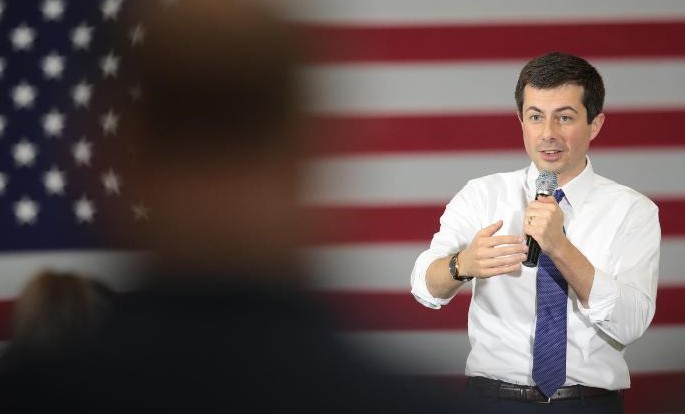
Lieutenant Pete Buttigieg
US Navy Officer
Openly gay South Bend, Indiana Mayor and
Presidential candidate Pete Buttigieg
was also in the military. Lieutenant
Buttigieg served for seven months in
Afghanistan as an Intelligence Officer
in the US Navy Reserve. While deployed,
he was assigned to the Afghan Threat
Finance Cell, a counterterrorism unit
that targeted Taliban insurgency
financing.
Like many other presidential candidates
Mayor Pete's campaign staff leaned hard
on his seven-month deployment as an
intelligence officer in Afghanistan as a
powerful credential. In doing so,
Buttigieg walks a narrow path between
giving his wartime service its due and
overstating it.
He is careful not to call himself a
combat veteran even as he notes the
danger he faced. As any candidate who
has prior military service, Buttigieg
expected intense scrutiny of his
military record in a political climate
where military service is far from
sacred, as past attacks
on the
records
of Republican John McCain and Democrat
John Kerry show.
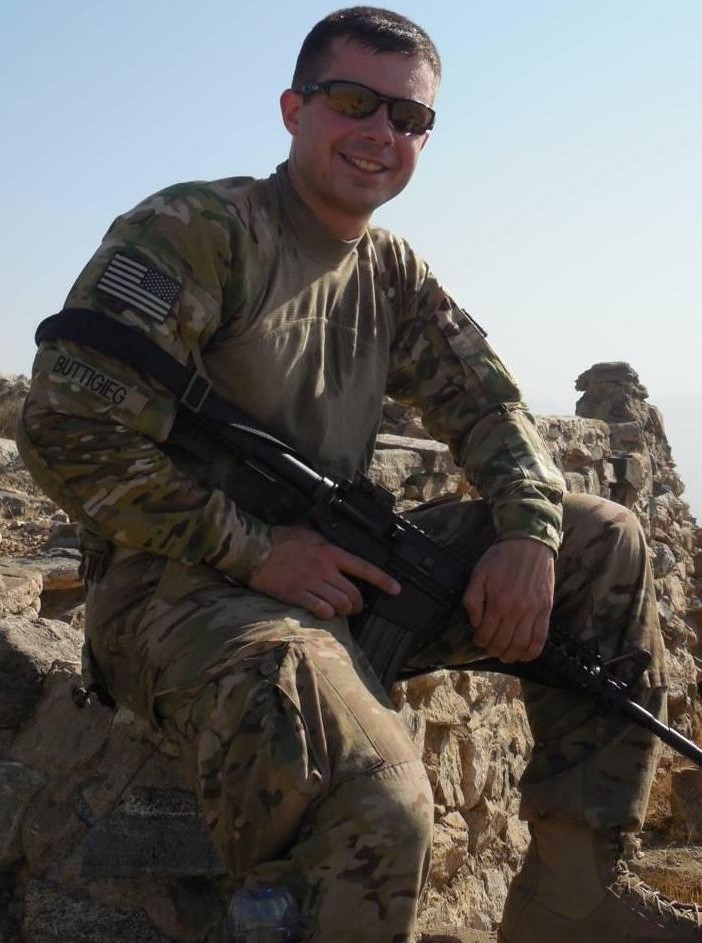
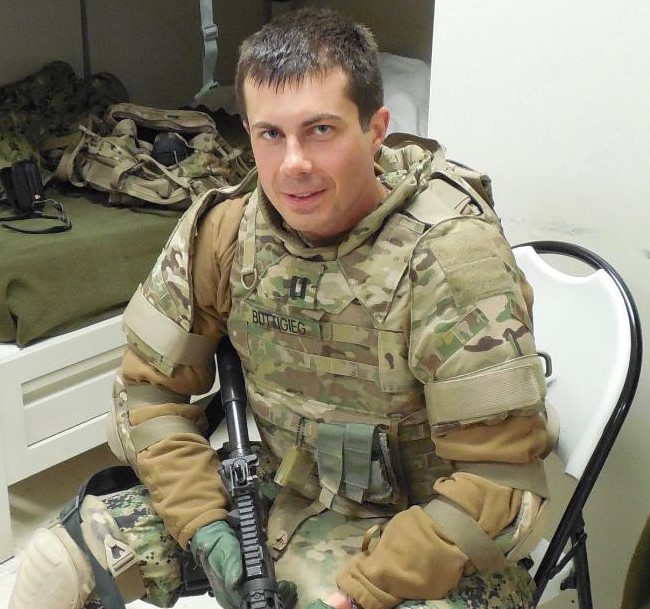
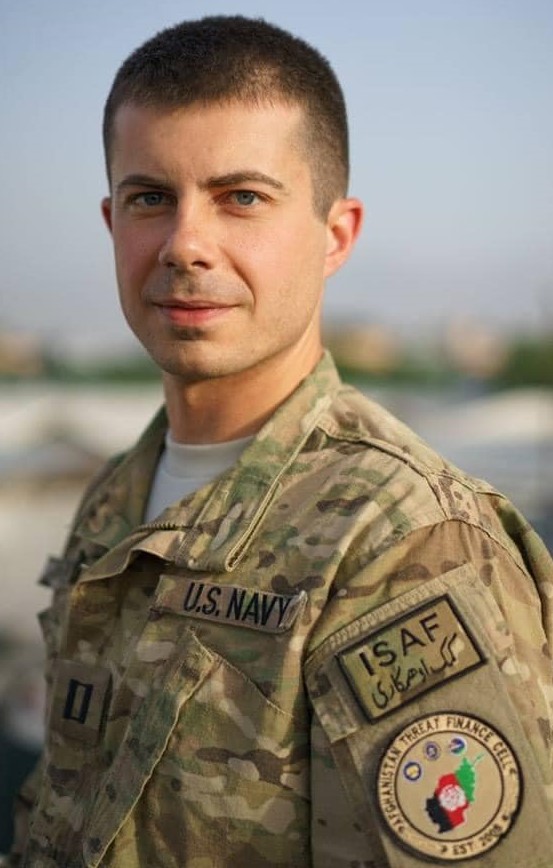
AP: Buttigieg Touts Military Service,
Wary of Overstating Role
The Hill: Glimpse Into Pete Buttigieg's
Military Service
CNN: Pete Buttigieg Touts Military
Service on Campaign Trail
Buttigieg
addressed the subject with reporters
during his campaign. “It kind of felt
like combat when the rocket alarm went
off,” he said. “But I don’t feel
prepared to use that term for myself.”
He volunteered for service and was
quickly recognized for his intellect.
Retired Col. Guy Hollingsworth chose
Buttigieg as the lead analyst tracking
the flow of money to terrorist cells in
Afghanistan, information that would
inform combat operations.
Though more of Buttigieg’s time in
Afghanistan was spent working in a
secured intelligence office as an
officer in the US Navy Reserve, his
dozens of trips outside US/NATO
headquarters in the fortified Green Zone
make him a combat veteran in the eyes of
Hollingsworth, Buttigieg’s commanding
officer. During these movements,
Buttigieg, in body armor and an M4 rifle
nearby, would typically drive a team of
officials, navigating an armored SUV
through Kabul’s chaotic streets. “That
is the definition, going down range into
a combat zone,” Hollingsworth said. “He
is a combat veteran.”
“I don’t have to throw myself a military
parade to see what a convoy looks like
because I was driving in one around
Afghanistan right about the time this
president was taping season seven of
Celebrity
Apprentice,”
Buttigieg told one audience in Des
Moines.
[Source: Associated Press]
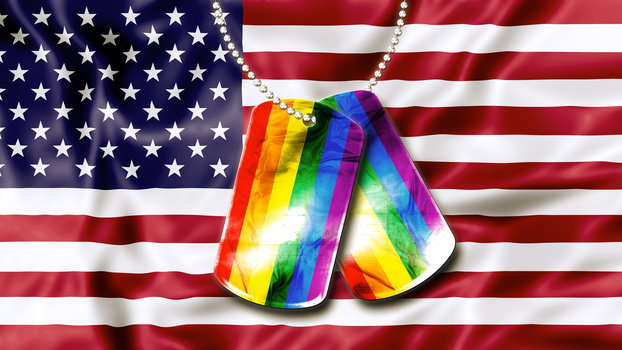
Modern Military
Association of America
Trump Just Fired Me Because I'm Trans
HRC Denounces Trump's Trans Troop Ban
Judge Rebukes Trump Over Trans Military Ban
Research: LGBTQ and Health
Related Behaviors in US Military
Resources for LGBTQ
Military Families
CNN: Transgender Ban Goes Into Effect
Advocate: Trump's Military Ban Ignores Science to
Inflict Harm
BuzzFeed: Trans Troops Now Banned From US Military
President Trump Bans Trans Troops
In June
2017, President Donald Trump declared that
transgender people weren’t fit to serve in any branch of
the armed service in any capacity, citing a strain and
distraction to the United States military readiness. His
exact words were:
“After consultation with my generals and military
experts, please be advised that the United States
Government will not accept or allow transgender
individuals to serve in any capacity in the US Military.
Our military must be focused on decisive and
overwhelming victory and cannot be burdened with the
tremendous medical costs and disruption that transgender
in the military would entail.”
In April
2019, Trump's trans troop ban went into effect.
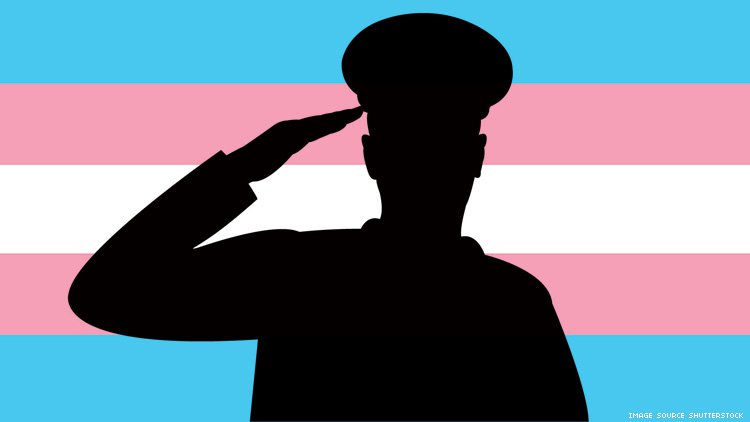
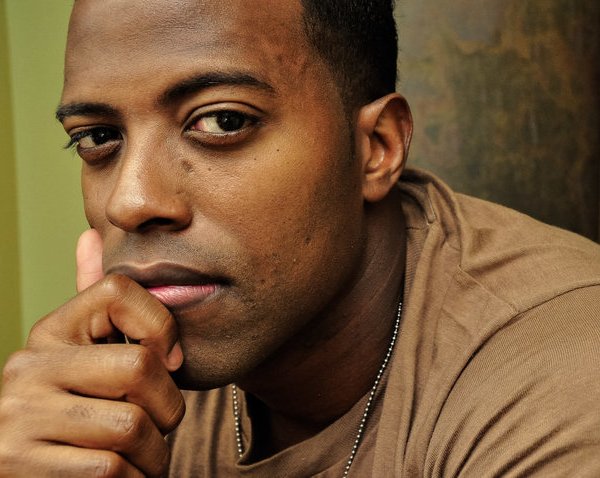
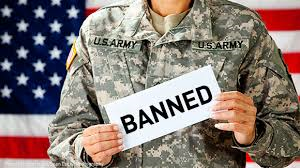
Rest in Peace: Veteran Comes Out as Gay in His Own
Obituary
What It's Like to Be Gay
in the Military
NPR: How Trans Troop Ban is Affecting One Military
Family
Info: LGBTQ Police Officers and Firefighters
No Allies Here: Trump Bans Transgender People From Military
Pentagon Says Trans Troops Can Still Serve
Legal and Financial Considerations: Gay and Lesbian Service Members
Army Guy's Coming Out Story
Family Member Speaks Out After Military Veteran Reveals
in Obituary He is Gay
First Black Female Gay Soldier to Pass Ranger School
Trans Service Members Make
Public Statement at VMA Event Military Academy Graduates First Openly Gay Cadets
Same Sex Wedding at West Point
Transgender Video Documentary: At War and In Love
Maj Gen Patricia Rose: Highest Ranking LGBTQ Member of
US Military
New Normal: Gay Interracial Military Weddings I Was Called a Faggot My First Day in the Army
First Active-Duty Gay Couple Married at West Point
Gay Soldier Berated in Restaurant
Message for LGBTQ Troops from Secretary of Defense
Secretary of Defense Ash Carter delivered this LGBTQ Pride Month message on June 7, 2016:
June is Lesbian, Gay, Bisexual, Transgender, and Queer Pride Month, an occasion that brings the LGBTQ community together with their family, friends, and allies to take pride in themselves and their many achievements. The US Department of Defense recognizes Lesbian, Gay, Bisexual, Transgender, and Queer service members and civilians for their dedicated service to the department and the nation.
Throughout our history, brave LGBTQ soldiers, sailors, airmen, Coast Guardsmen, and Marines have served and fought for our nation. Their readiness and willingness to serve has made our military stronger and our nation safer. We continue to take great pride in all that these men and women contribute to the department and our mission. Their hard work, courage, and sacrifices make them respected members of our diverse DOD family.
Pentagon Overturns Military's Ban on
Trans Troops
Transgender Military Ban Lifted
Senate Confirms First Openly Gay Army
Secretary
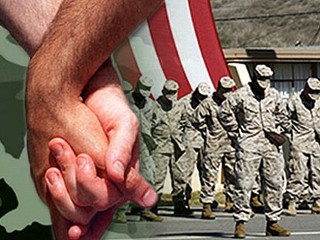
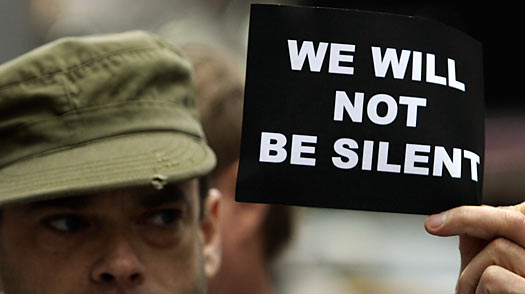
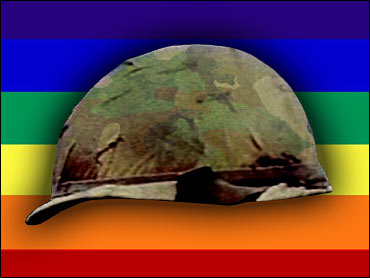
Through their service these Americans
help ensure that we as a force embody
the values we’re sworn to uphold. And
that our republic, born from the idea
that all are created equal, endowed with
unalienable rights to life, liberty, and
the pursuit of happiness, will remain
strong and secure. These words are more
than a pinnacle to strive for, they are
principles we must promote every day.
As we celebrate LGBTQ Pride Month
together, let us take pride in all who
step forward to serve our country. All
who answer the call to service are doing
the noblest thing they can do with their
lives: to provide the security for
others so they can dream their dreams,
raise their children, and live full
lives.
Update: Biden Lifts
Trump's Trans Military Ban
Policies Concerning LGBTQ Members of the Military
LGBTQ Service Members: Out and Proud
TED Talk: Gays in the Military
What It's Like to Be Gay in the Military
Biden Reverses Trump's Transgender Military Ban
Two Gay Soldiers Secretly Fell in Love in the ‘70s
Why We Need Trans People in the US Military
Jody Davis: Veteran,
Nurse, Transgender
Marine Corps Celebrates Pride, Puts Down Homophobes
President Biden Overturns
Ban on Transgender Military Personnel
Info:
LGBTQ Police Officers and Firefighters
Modern Military
Association of America

US Navy Ship to be Named After Harvey Milk
In July 2016, the US Navy has sent
congressional notification that it
intends to name a new oiler ship after
slain gay rights activist Harvey Milk.
The Navy is declining to comment further
until the official naming announcement.
Harvey Milk was a San Francisco
politician and gay rights activist. He
was murdered in 1978.
Once commissioned, the USNS Harvey Milk
would be part of the John Lewis-class
oilers, a class named after Georgia
Congressman and civil rights icon Rep.
John Lewis. This particular class of
vessels would be named after various
leaders from the civil rights movement.
Milk, the first openly gay politician
from California to be elected to office,
served in the US Navy as a dive
instructor in San Diego during the
Korean War.
The oiler is a combat logistics ship
that replenishes other ships at sea with
fuel and other provisions such as food.
[Source: CNN]
LGBTQ Nation: Navy Ship to Be Named for
Harvey Milk
Huffington Post: Navy is Naming Ship
After Harvey Milk
CNN: US Navy to Name Ship After Harvey
Milk
LGBTQ Nation: Navy Secretary Defends
Decision to Name Ships After Civil
Rights Icons
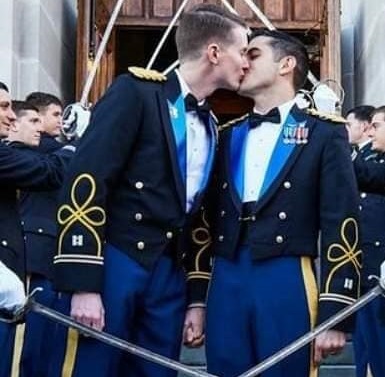
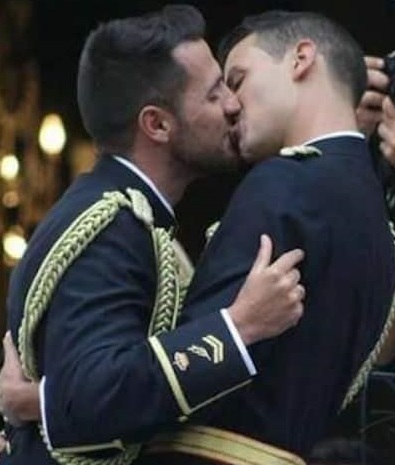
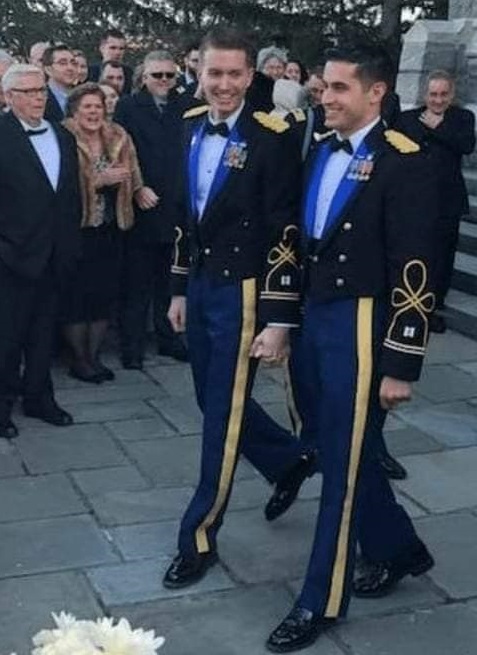
LGBTQ Military
Members
Tammy Smith
- US Army General
Reichen Lehmkuhl - US Air Force Officer
Pete Buttigieg - US Navy Officer
Rachel
Levine - US Navy Admiral
Joseph
Rocha - US Navy and Marine Corp
Lea G.
Lauderback - US Air Force Lt General
John
Olbrys - US Coast Guard Officer
Gary Ross - US Navy Officer
Jody Davis - US Army RN
Bree Fram
- US Air Force/Space Force Colonel
Dan Choi - US Army Officer
Alan
Rogers - US Army Officer
Kristin
Beck - US Navy Seal
Patricia
Rose - US Air Force Officer
Frank
Kameny - US Army
Harvey
Milk - US Navy Officer
Dana Zzyym
- US Navy
Chelsea
Manning - US Army
Leonard
Matlovitch - US Air Force
Catherine
McGregor - Australian Army/Air Force Officer
Baron
Friedrich von Steuben - US Revolutionary War Hero
Modern Military Association of America
Transgender Ban: About Hate Not Money
Trump's Ban: Trans Veterans Respond
Defense Secretary Appalled by Trump's Announcement
What It's Like to Be Gay in the Military
Army Guy's Coming Out Story
Journey of an LGBTQ Military Spouse
Trans Military Ban: Joint Chiefs Respond
Why We Need Trans People in the US Military
Trans Service Members Make
Public Statement at VMA Event
Sexual Orientation and Gender Identity in Military
Service
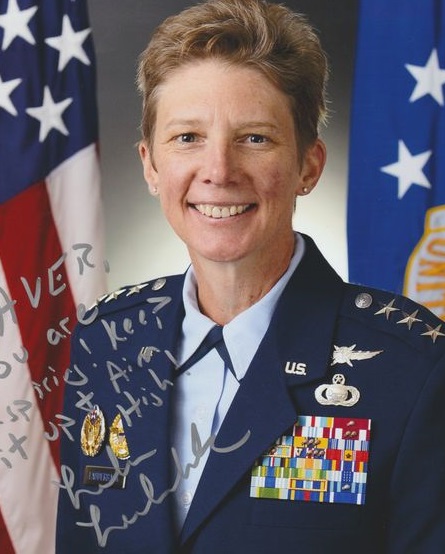
Lieutenant General Lauderback
Lieutenant General Lea G. Lauderback is
the Deputy Chief of Staff for
Intelligence, Surveillance,
Reconnaissance and Cyber Effects
Operations, Headquarters US Air Force,
the Pentagon. She is the Air Force's
senior intelligence officer and the
highest ranking LGBTQ officer in the
United States Armed Forces. The General
is the fist LGBTQ officer to be
nominated by the President of the United
States and approved by Congress. Thank
you for your service General Lauderback
and for representing our LGBTQ community
with pride and service.
Policies Concerning LGBTQ Members of the
Military
Lesbian Earns Major General Rank
What It's Like to Be Gay in the Military
TED Talk: Gays in the Military
LGBTQ
Service Members: Out and Proud
Info:
LGBTQ Police Officers and Firefighters
What It's
Like to Be a Gay Military Couple
Obama Appoints Gay Man as Undersecretary
of Air Force
11 Major Milestones After the End of
DADT
BuzzFeed: Trans Troops Now Banned From US Military
Research: LGBTQ and Health
Related Behaviors in US Military
Repeal of DADT Policy
“By ending “Don’t Ask, Don’t Tell,” no
longer will patriotic Americans be asked
to live a lie in order to serve the
country they love.”
-Barack Obama
“Thank you Senators for pushing us one
step closer towards full equality,”
-Ellen DeGeneres
"This is a stepping stone to further
advances for the gay and lesbian
community."
-Joe Solmonese / HRC President
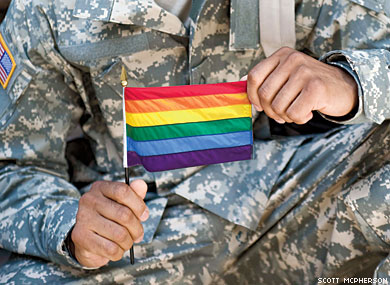
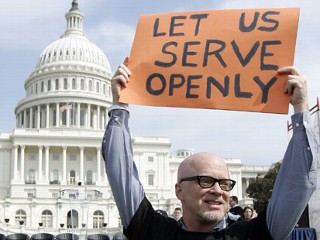
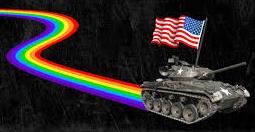
The US Senate voted in December 2010 to
repeal the Don't Ask Don't Tell policy
by a 65-31 margin. This repeal of DADT
reverses the US military's 17 year ban
on gay men and women openly serving
among their ranks. DADT was made a law
seventeen years ago and is the only US
law that punishes people for simply
telling the truth. Since the law went
into effect, over 14,000 gay and lesbian
service members have been discharged
from our nation's military simply
because they were gay or lesbian. An
estimated 66,000 gays and lesbians are
currently on active-duty.
Twenty-three studies over the past fifty
years, including most recently a
comprehensive study by the Pentagon,
have concluded the same thing: that
there would be no to minimal impact on
force cohesion or unit readiness by
allowing gays and lesbians to serve
openly in the US military.
Thirty-countries currently allow gays
and lesbians to serve in their nation's
armed forces. Senator Joe Lieberman
said, "This historic day has been
seventeen years in the making and would
not have happened without the leadership
of Joe Solmonese and the Human Rights
Campaign."
Rest in Peace: Veteran Comes Out as Gay
in His Own Obituary
Research:
LGBTQ and Health Related Behaviors in US
Military
End of DADT Means Decision Time for Gay
Troops
Journey of an LGBTQ Military Spouse
Sexual Orientation and Gender Identity in Military Service
Why We Need Trans People in the US Military
Resources for LGBTQ
Military Families
Two Gay Soldiers Secretly Fell in Love in the ‘70s
Family Member Speaks Out After Military Veteran Reveals
in Obituary He is Gay
Video: Lesbian Military Couple
Modern Military Association of America
History-Making LGBTQ Veterans Who Fought
for Equality
Update: US Navy Ship
Harvey Milk
HRC Denounces Trump's Trans Troop Ban
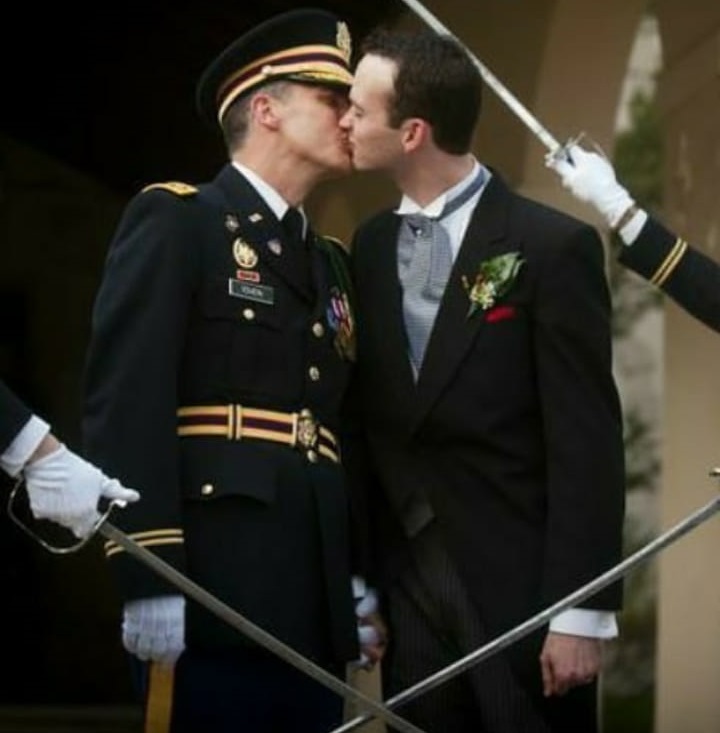
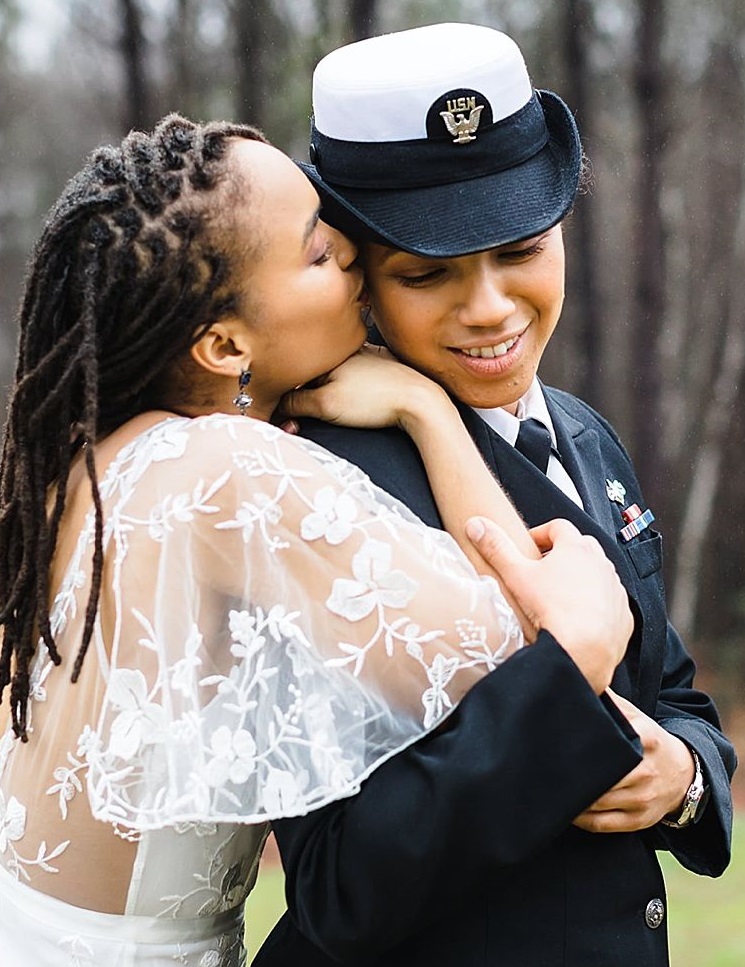
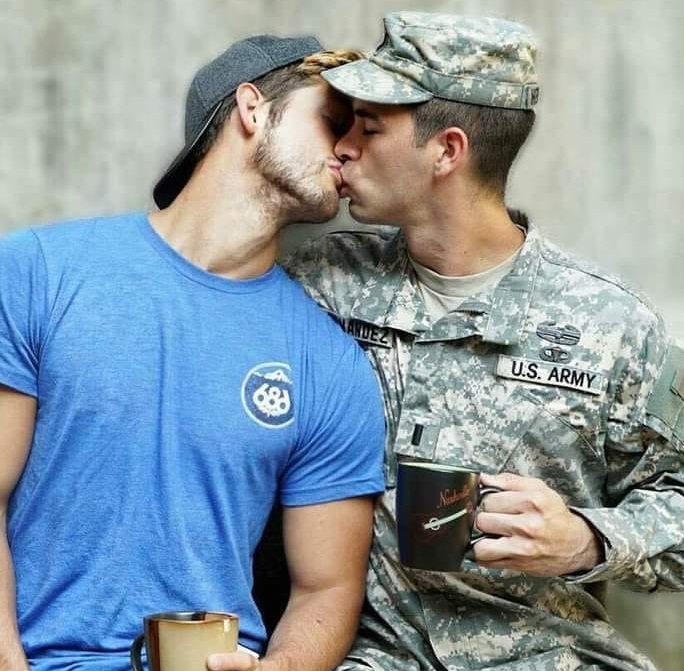
Policies Concerning LGBTQ People in the
Military
Throughout its history, the US Military
has had an inconsistent policy when it
comes to gay people in the military.
Prior to World War II, there was no
written policy barring LGBTQ people from
serving, although any type of sodomy,
regardless of sexual orientation, was
considered a crime by military law, and
this was frequently used to bar members
of the LGBTQ community from serving.
LGBTQ
Policies in the Korean War and Vietnam
War
During World War II, the
Korean War, and the Vietnam War, the military considered
anyone that identified as part of the LGBTQ community to
have a mental defect and officially barred them from
serving based on medical criteria. However, when
personnel needs increased due to combat, the military
developed a habit of relaxing its screening criteria.
Many gay people were admitted and served honorably
during these conflicts. This did not eliminate
discrimination, however, and these periods were
relatively short-lived. As soon as the need for combat
personnel decreased, the military would involuntarily
discharge them.
1982 - Military Ban
on Homosexuality
It wasn't until 1982 that the Department of Defense
(DOD) officially put in writing that “homosexuality was
incompatible with military service,” when it published a
DOD directive stating such. It defined a homosexual
person as someone "regardless of sex, who, engages in,
desires to engage in, or intends to engage in homosexual
acts.” And it defined a homosexual act as any “bodily
contact, actively undertaken or passively permitted,
between members of the same sex for the purpose of
satisfying sexual desires.” According to a 1992 report
by the Government Accounting Office, nearly 17,000 men
and women were discharged under this new directive
during the 1980s.
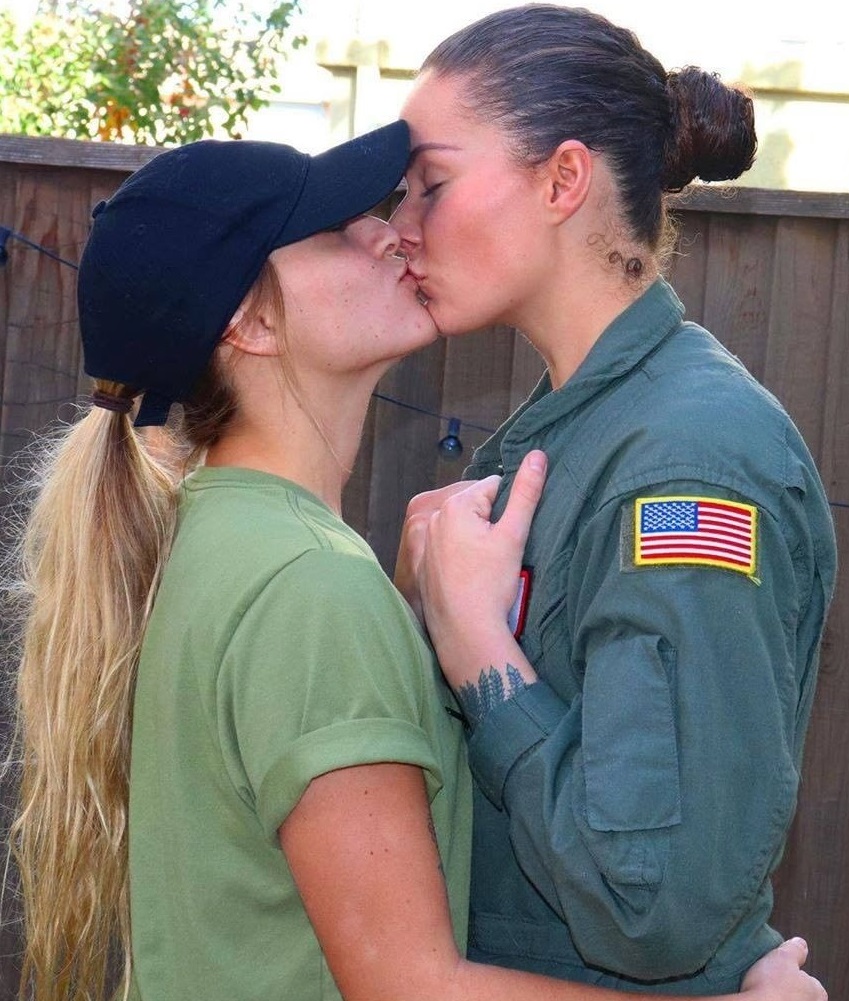
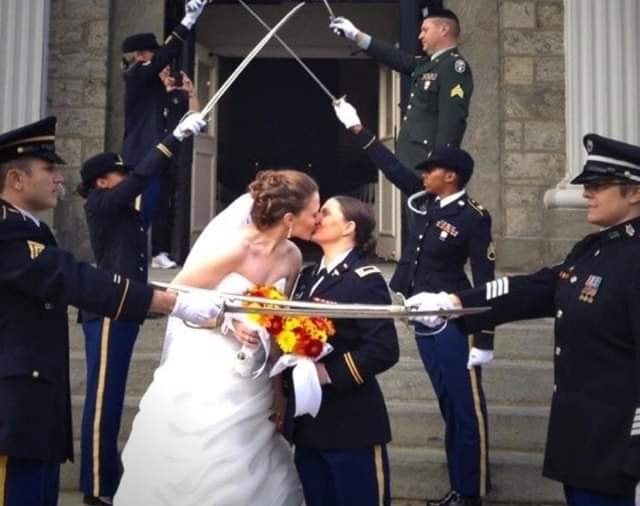
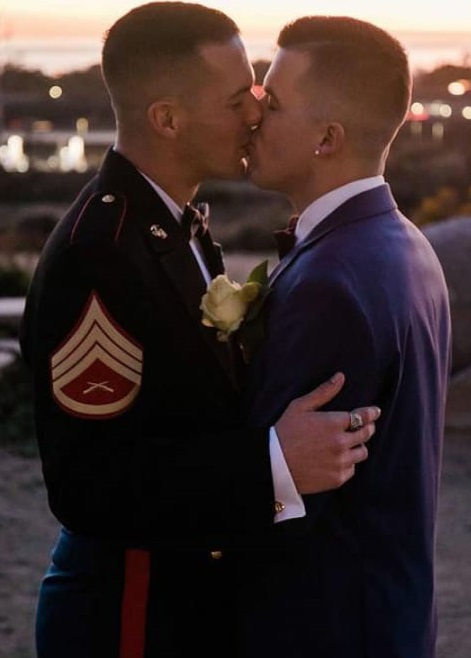
Modern Military Association of America
Memorial Day Lesson: Hate Diminishes the Memory of Our
Fallen
Pentagon Report Says Fears About Gays in the Military
Were Vastly Overblown
Judge Rules US Military Can't Discharge
HIV-Positive Troops
Lesbian Sues Military After She Was Told to Wear Makeup
and Grow Long Hair
Biden Administration to Officially Recognize Trans &
Non-Binary Veterans’ Genders
Gay Navy Vet's Widower Fights for Benefits in Historic
Appeal
Update: Biden Lifts
Trump's Trans Military Ban
Colin Powell Dies: Supporter and Then Critic of Don't Ask Don't Tell
LGBTQ Military Leaders to Salute on Veterans Day
1993 -
The Birth of "Don't Ask, Don't Tell"
By the end
of the 1980s, reversing the military's policy was
emerging as a priority for advocates of LGBTQ+ civil
rights. Several lesbian and gay members of the military
came out publicly and vigorously challenged their
discharges through the legal system. By the beginning of
1993, it appeared that the military's ban on gay
personnel would soon be overturned.
President Clinton announced that he intended to keep his
campaign promise by eliminating military discrimination
based on sexual orientation. But, this didn't sit well
with the Republican-controlled Congress. Congressional
leaders threatened to pass legislation that would bar
gay people from serving if Clinton issued an executive
order changing the policy.
After lengthy public debate and congressional hearings,
the President and Senator Sam Nunn, chair of the Senate
Armed Services Committee, reached a compromise, which
they labeled "Don't Ask, Don't Tell" (DADT).
Under its terms, military personnel would not be asked
about their sexual orientation and would not be
discharged simply for being gay. However, having sexual
relations with or displaying romantic overtures to
members of the same sex, or telling anyone about their
sexual orientation was considered "homosexual conduct"
under the policy and a basis for involuntary discharge.
This is was known as the Don't Ask, Don't Tell law and
became the DOD policy.
Changing Times for Society and the Military
At the
time, most military leaders and young enlisted (who were
forced to live in the barracks with a roommate) took a
conservative view about allowing gay people and other
members of the LGBTQ community to serve openly in the
military.
But the attitudes of society gradually changed through
the next two decades. By 2010, more junior enlisted
members' attitudes had changed, and they would not be
bothered by serving with those they know to be gay.
Furthermore, more service members, like those in general
society, felt that discrimination against LGBTQ groups
was unfair.
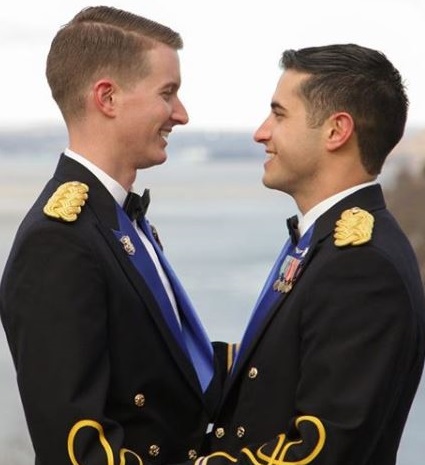
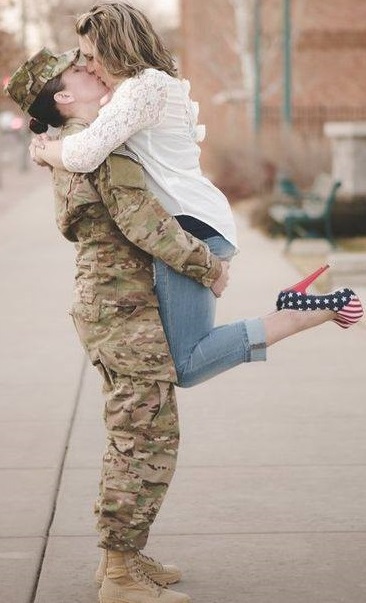
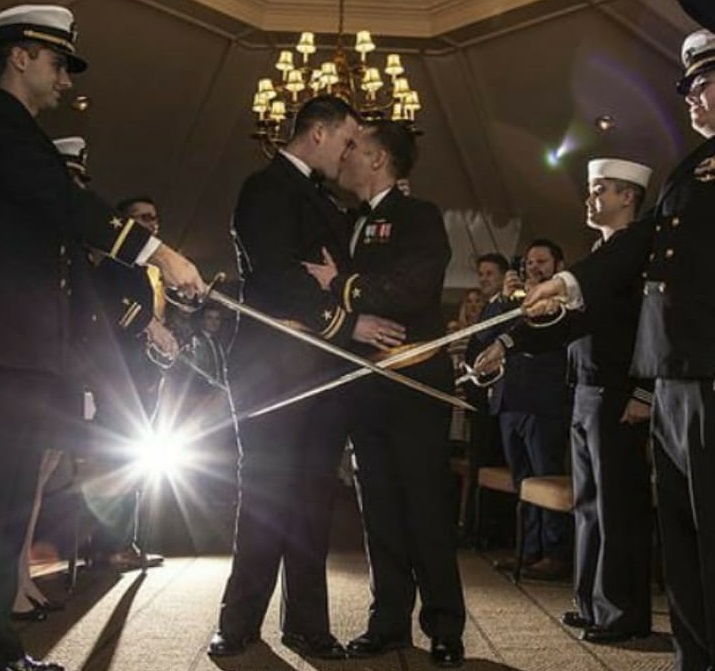
History-Making LGBTQ Veterans Who Fought
for Equality
Update: US Navy Ship
Harvey Milk
HRC Denounces Trump's Trans Troop Ban
Veteran's Day: LGBTQ People Share Stories of Celebration
CNN: Transgender Ban Goes Into Effect
BuzzFeed: Trans Troops Now Banned From US Military
Research: LGBTQ and Health
Related Behaviors in US Military
Modern Military Association of America
Veteran's Day: LGBTQ People Share Stories of Celebration
CNN: Transgender Ban Goes Into Effect
LGBTQ Service Members: Out and Proud
2010 - Repeal of
DADT
In
December of 2010, the House and Senate voted to repeal
and overturn DADT. President Obama then signed the Don't
Ask, Don't Tell Repeal Act into law December 22, 2010.
The nation decided that by September 20, 2011, gay
service members would no longer fear discharge from the
military by admitting to their sexual preference—they
could serve openly.
More than 13,000 service members were discharged for
being gay while the DADT policy was in effect. The
repeal prompted many to try and reenlist. Many gay and
bisexual service members who had been serving came out
of the closet on various media. Many organizations and
groups supporting gay military members surfaced and even
organized official public gatherings with the military.
2013 -
Recognition of Same-Sex Marriages
Although
the repeal of DADT in 2010 made it possible for gay
people to serve openly without fear of discharge, the
new law still did not extend many of the benefits that
straight members received to gay service members. These
included things such as dependent health care benefits
and housing allowances.
Following the Supreme Court ruling that struck down the
Defense of Marriage Act in 2013, the DOD announced it
would extend spousal and family benefits for same-sex
marriages that would be the same as those given for
traditional marriages.
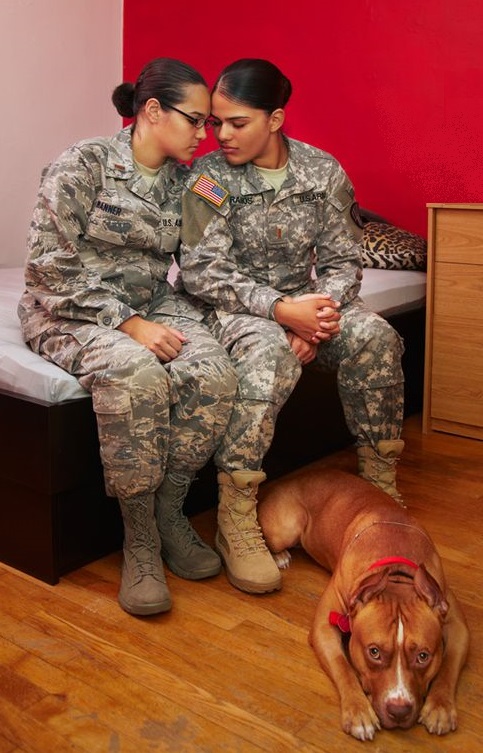
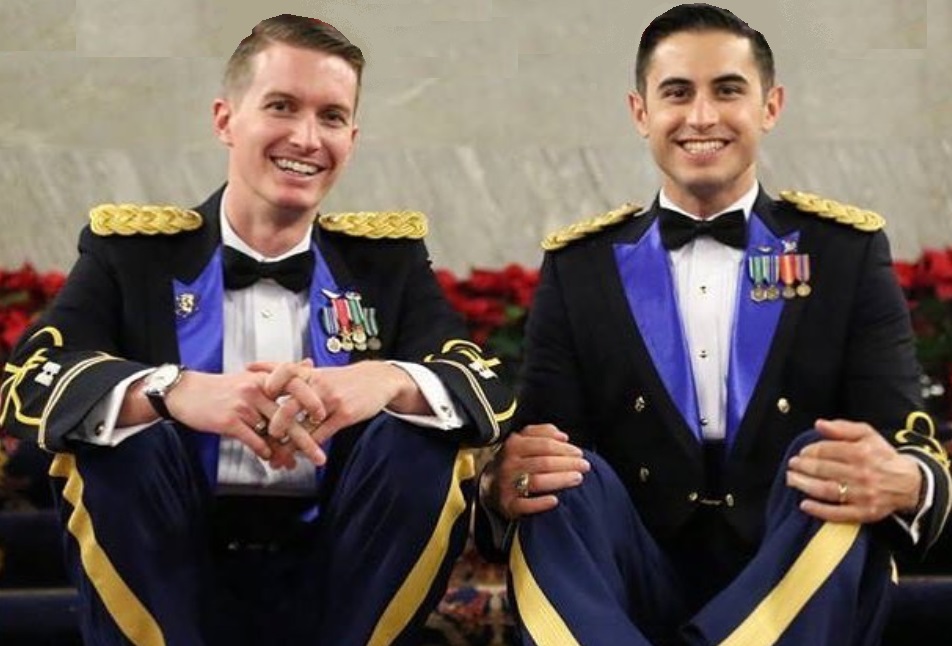
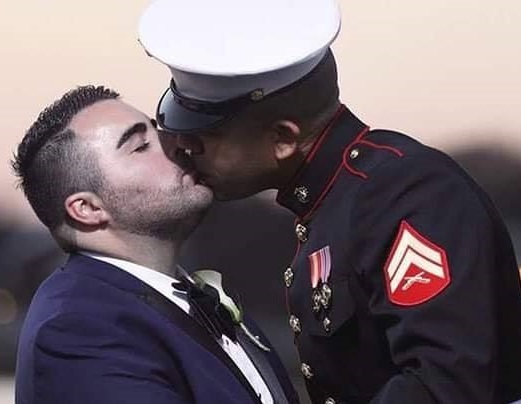
Policies Concerning LGBTQ Members of the Military
LGBTQ Vets Discharged Dishonorably for Sexual Orientation to get Full Benefits
LGBTQ Service Members: Out and Proud
Rest in Peace: Veteran Comes Out as Gay in His Own Obituary
TED Talk: Gays in the Military
What It's Like to Be Gay in the Military
Biden Reverses Trump's Transgender Military Ban
Why We Need Trans People in the US Military
Jody Davis: Veteran,
Nurse, Transgender
Marine Corps Celebrates Pride, Puts Down Homophobes
President Biden Overturns
Ban on Transgender Military Personnel
2016-2021 - Transgender
Regulations
In recent
years, the battle over equal rights in the military has
shifted toward transgender issues. Until 2016, there was
an outright ban on any transgender service members
across all branches of the military.
This changed on July 1, 2016, when the Obama
administration announced that this ban would be lifted.
The new policy would allow transgender individuals with
no history of gender dysphoria, a condition in which
someone experiences intense psychological discomfort
with their biological sex, to serve while adhering to
standards for their biological sex. Those with a history
of gender dysphoria could transition and serve according
to their preferred gender after 18 months in stable
condition post-transition.
In 2018, the DOD reversed these changes under the Trump
administration, effectively barring transgender members
who were not willing and able to serve according to
their biological sex. Members who were admitted during
the period of the previous policy were allowed to remain
and serve under those standards.
President Biden reversed these changes by executive
order during his first days in office in January 2021.
[Source: Rod Powers, February 2021]
Update: Biden Lifts
Trump's Trans Military Ban
Policies Concerning LGBTQ Members of the Military
Research: LGBTQ and Health Related Behaviors in US Military
LGBTQ Service Members: Out and Proud
Sexual Orientation and Gender Identity in Military
Service
TED Talk: Gays in the Military
What It's Like to Be Gay in the Military
LGBTQ in the Military: Current Policies
Acceptance of LGBTQ Service Members
Since 2011, openly gay, lesbian and bisexual men and women have been permitted to serve in the military. Acceptance for LGBTQ in the military expanded with the lifting of the transgender ban in 2021.
Still, some LGBTQ service members may worry about living openly. They may fear being harassed or passed over for assignments or promotions. While acceptance of LGBTQ service members is a relatively new development in the military’s long history, the Department of Defense is committed to maintaining a strong force that reflects the nation’s diversity.
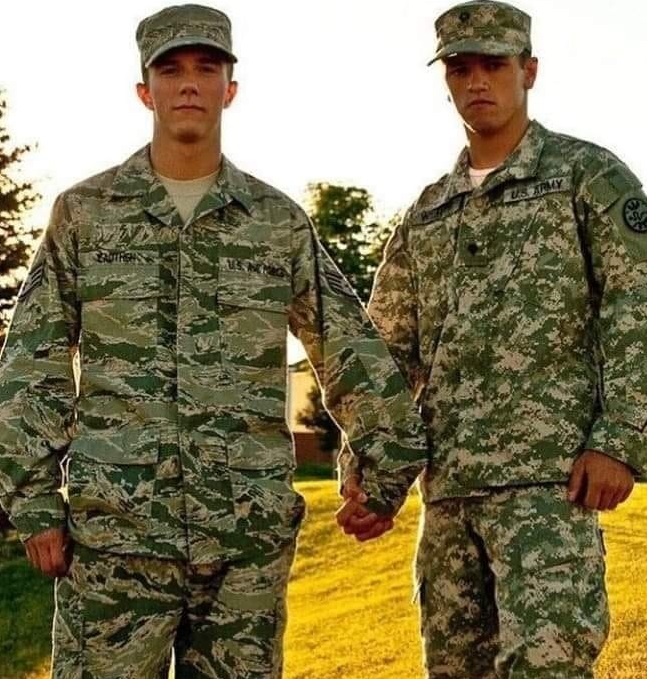 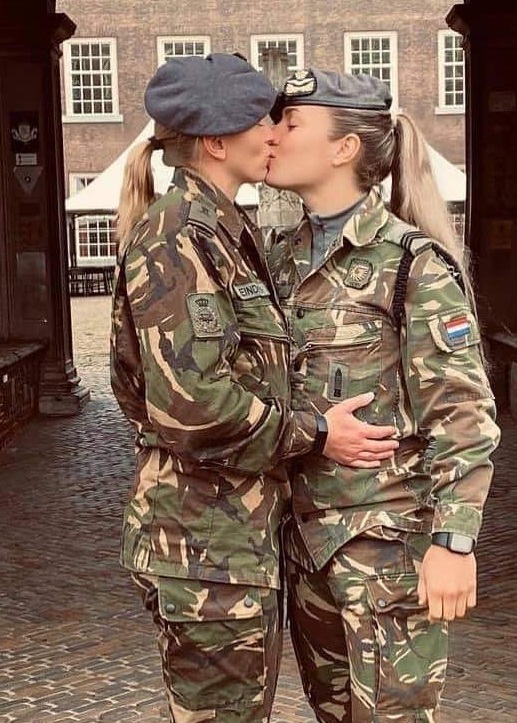 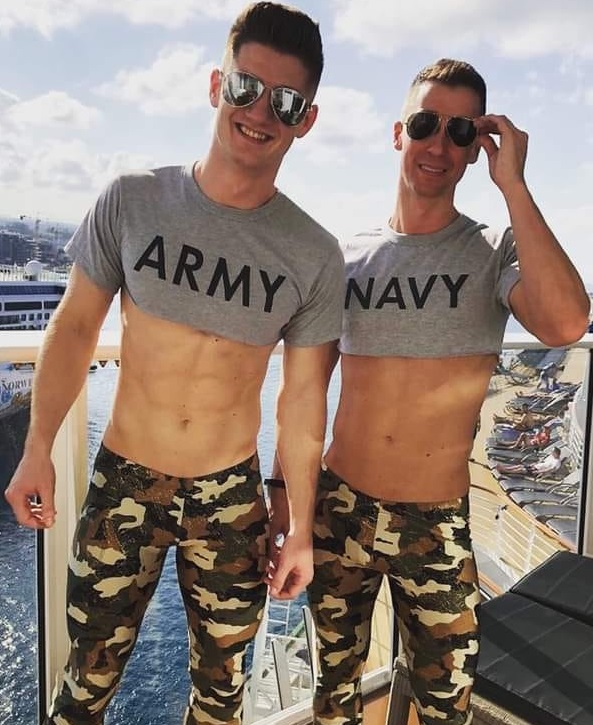
Biden Reverses Trump's Transgender Military Ban
Why We Need Trans People in the US Military
Info: LGBTQ Police Officers and Firefighters
Jody Davis: Veteran,
Nurse, Transgender
Modern Military Association of America
Marine Corps Celebrates Pride, Puts Down Homophobes
President Biden Overturns
Ban on Transgender Military Personnel
The history of
LGBTQ in the military
It wasn’t until 1982 that the military enacted a policy
explicitly banning gay men and lesbians from their
ranks. Before that, however, same-sex relations were
criminalized and cause for discharge. And in the early
1940s, it was classified as a mental illness,
disqualifying gay men and lesbians from service.
In 1993, the “don’t ask, don’t tell” policy went into
effect allowing closeted LGBTQ people to serve in the
military. Under the policy, service members would not be
asked about their sexual orientation, but would be
discharged for disclosing it. Eighteen years later,
Congress repealed the policy, allowing openly gay,
lesbian and bisexual people to serve in the military.
Another barrier was lifted in 2013 when spousal and
family benefits were extended to same-sex married
partners in the military. After ending temporarily in
2016, the ban on transgender individuals was again
rescinded in 2021, allowing those who don’t identify
with their biological gender to enlist and serve in the
armed forces.
Being
LGBTQ in the military
The Department of Defense recognizes the value of a
diverse force that represents society, and has taken
steps to promote acceptance and inclusion in its ranks.
But, given the military’s 245-year history, its policy
to accept LGBTQ service members into its ranks is still
relatively new. Cultural changes take time; stigma
against LGBTQ service members may linger. This can be a
barrier to living openly as an LGBTQ person in the
military.
If this is true of your service member, talk with them
about their concerns. The fear of backlash to living
openly is understandable, but keeping a key part of
their identity secret can affect their physical and
mental health. You can play an important role by being a
sounding board for your service member. You can help
your service member feel understood and supported just
by listening.
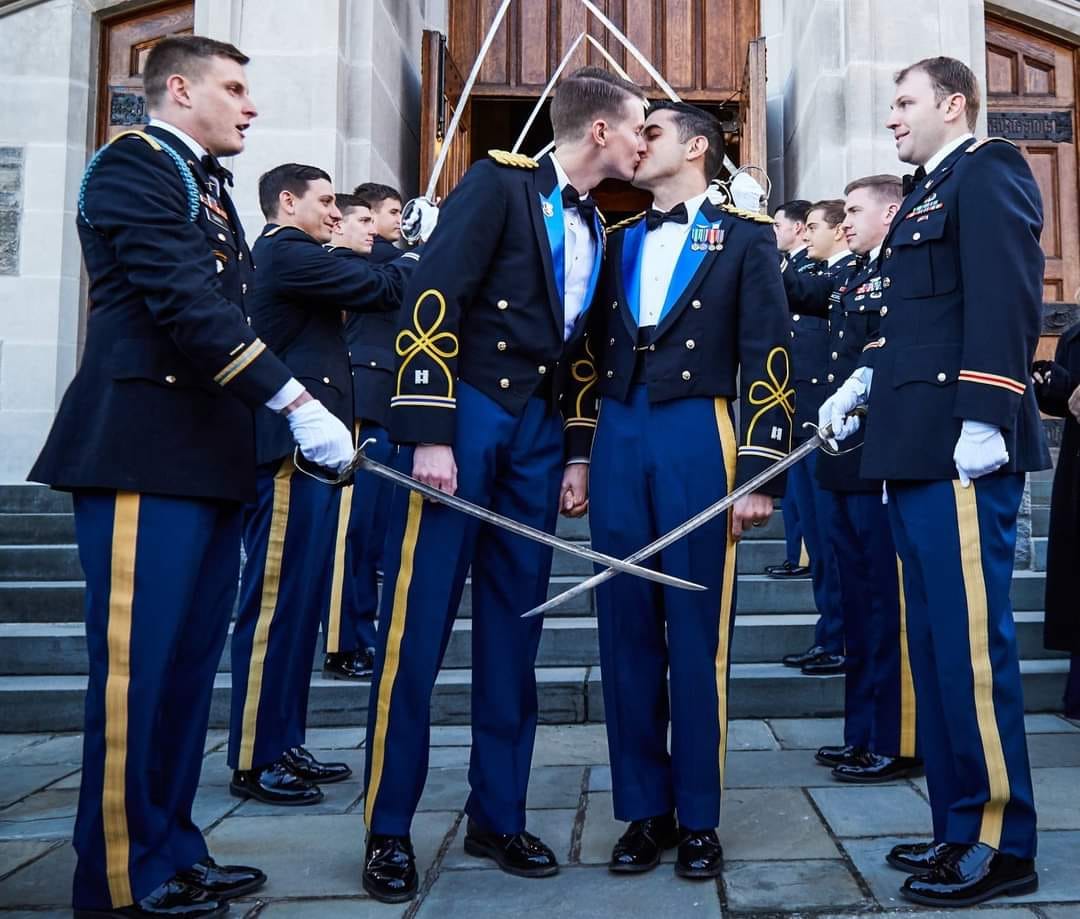
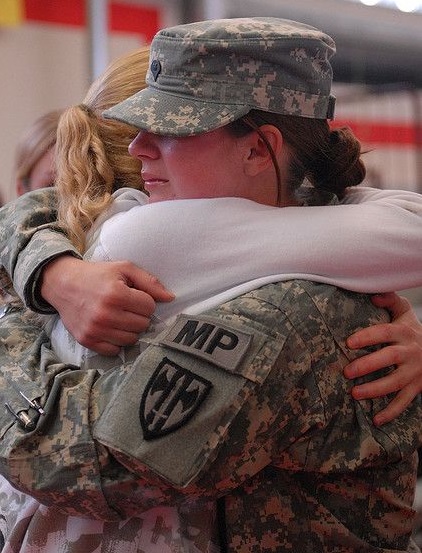
What It's Like to Be Gay
in the Military
NPR: How Trans Troop Ban is Affecting One Military
Family
Info: LGBTQ Police Officers and Firefighters
No Allies Here: Trump Bans Transgender People From Military
Pentagon Says Trans Troops Can Still Serve
Legal and Financial Considerations: Gay and Lesbian Service Members
If your LGBTQ
service member feels unsafe
If your service member is harassed or threatened, they
should document the incident in writing and through
photographs, if appropriate. They should also retain any
evidence, such as a threatening note, then bring a
formal complaint to their chain of command or the
military police.
If your service member feels they were passed up for a
promotion or denied an assignment because of their
sexual orientation or gender identity, they may file a
complaint with their service branch’s military equal
opportunity office.
If your service member feels isolated, they may find it
helpful to build a support network of fellow LGBTQ
service members. Their installation may have an LGBTQ
support group. If not, your service member may find one
in the community outside the installation.
Your service member may also benefit from talking with a
professional who is familiar with the military culture.
Free, confidential non-medical counseling is available
through their installation’s Military and Family Life
Counseling program and Military OneSource. Your service
member can connect with a counselor by calling
800-342-9647.
If your service member is in crisis, the Military Crisis
Line is staffed 24/7 with trained counselors. You or
your service member can reach the Military Crisis Line
at 800-273-8255.
Military
One Source
Modern Military Association of America
LGBTQ in the Military: A Brief
History, Current Policies and Safety
How the Military Supports Diversity and Inclusion
Child and Youth Behavioral Military and Family Life
Counselors
Sexual Orientation and Gender Identity in Military
Service
LGBTQ Healthcare in US Veterans Health Administration
Research: LGBTQ and Health
Related Behaviors in US Military
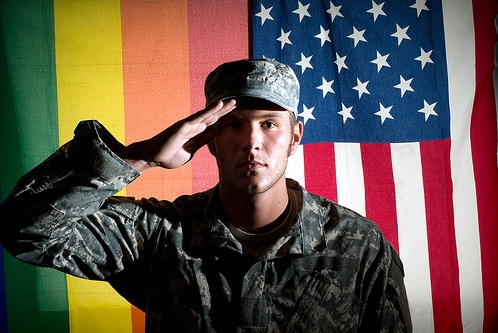
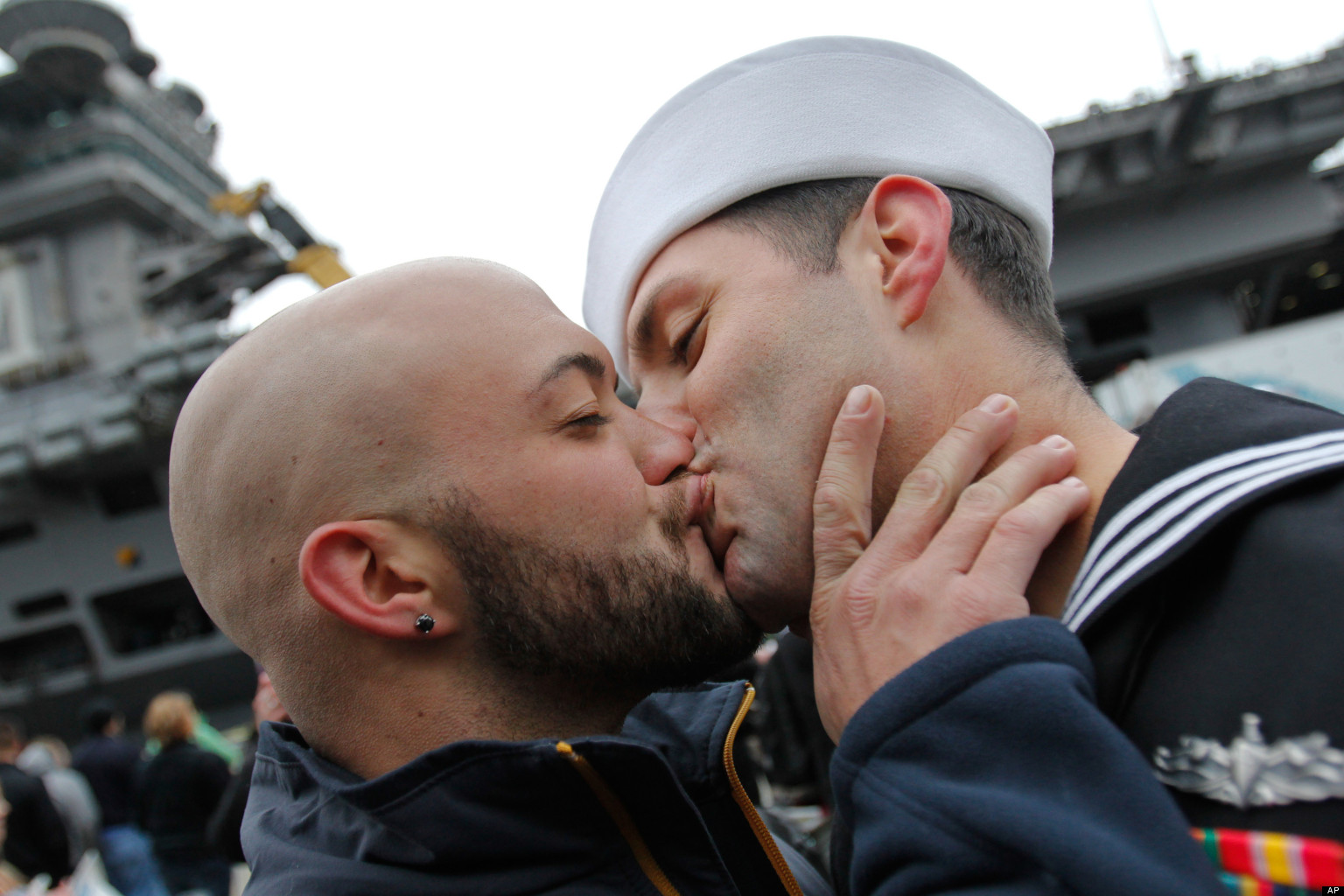
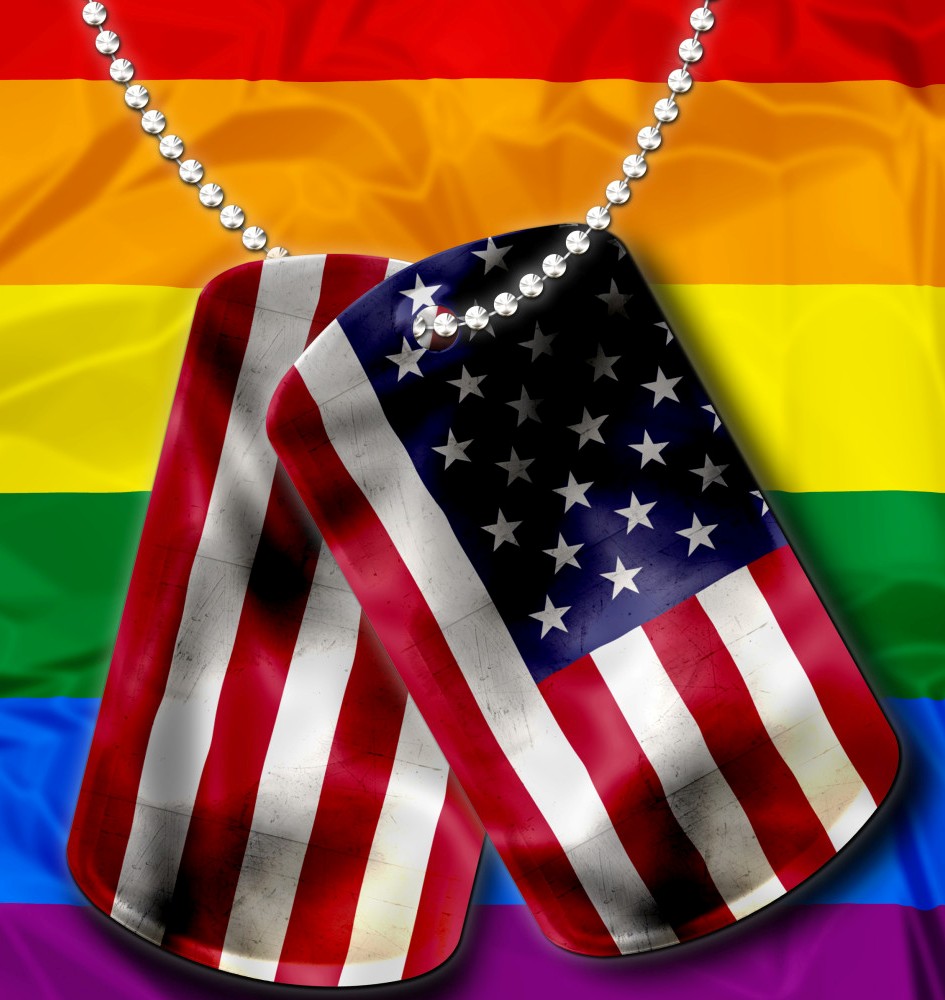
Reactions to Repeal of DADT
Gay and
Serving Proudly
DADT has been repealed! What does it
mean to you? "It's about time!" has
been the general reaction to the repeal
of the Don't Ask Don't Tell policy.
President Obama signed the repeal of
“Don’t Ask, Don’t Tell” into law on
December 22, 2010. It took effect in
September 2011.
“What
does it mean to me?" said one
respondent. "That finally the many, many
gay people who serve our country don't
have to hide who they are, as if being
gay makes them somehow less noble, less
brave, less strong. It is about time!”
Another person submitted this comment:
“It means that I can feel good knowing
the men and women who proudly serve the
country I love can be free to be
themselves without shame or forced
secrecy. To know that the American
freedom they fight for is something they
too can enjoy in uniform makes me even
prouder to be an American.”
Another comment: "Heterosexual,
homosexual, black, white, brown, yellow,
conservative, liberal, moderate - I
don't care what you are. The minute any
American chooses to defend our country
and the freedoms we get to live every
day - I thank you, I respect you, and I
only ever wish the best for you. I am
forever humbled by your nobility and
sacrifice - and I appreciate all you do,
always."
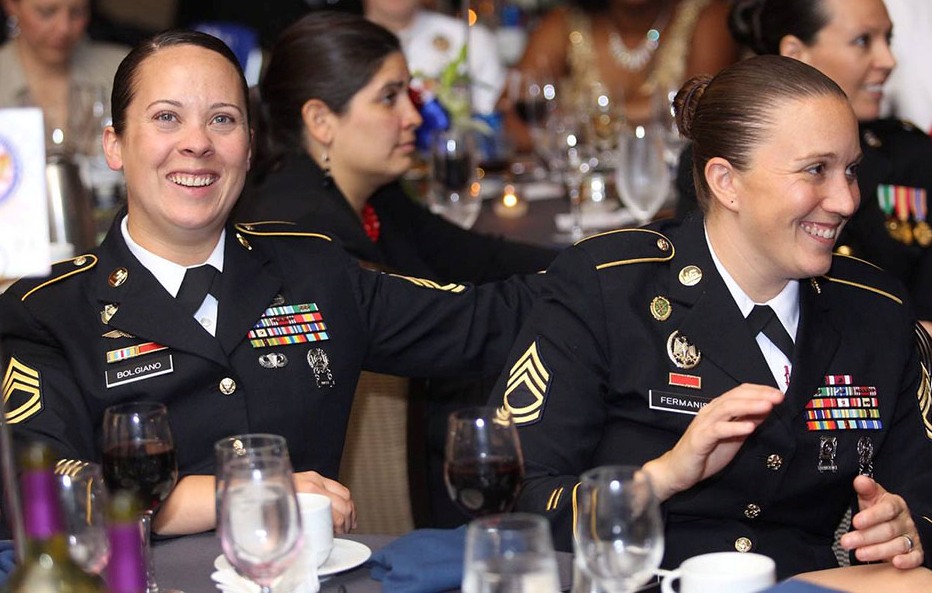
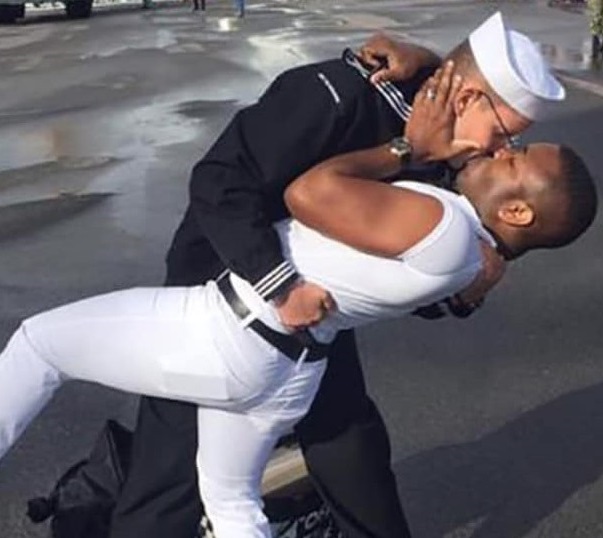
LGBTQ Military Organizations
--Modern Military Association of America
--American Military Partner Association
--American Veterans for Equal Rights
--Blue Alliance
--Knights Out
--OutServe/SLDN
--USNA Out
--SPARTA/Service Members, Partners and
Allies for Respect and Tolerance for All
--Transgender American Veterans
Association
Modern Military
Association of America
First Black Female Gay Soldier to Pass Ranger School Military Academy Graduates First Openly Gay Cadets
Transgender Video Documentary: At War
and In Love
Same Sex Wedding at West Point
TED Talk: Gays in the Military
New Normal: Gay Interracial Military Weddings
First Active-Duty Gay Couple Married at West Point
Info: LGBTQ Police Officers and Firefighters
What It's Like to Be Gay in the Military
Army Guy's Coming Out Story
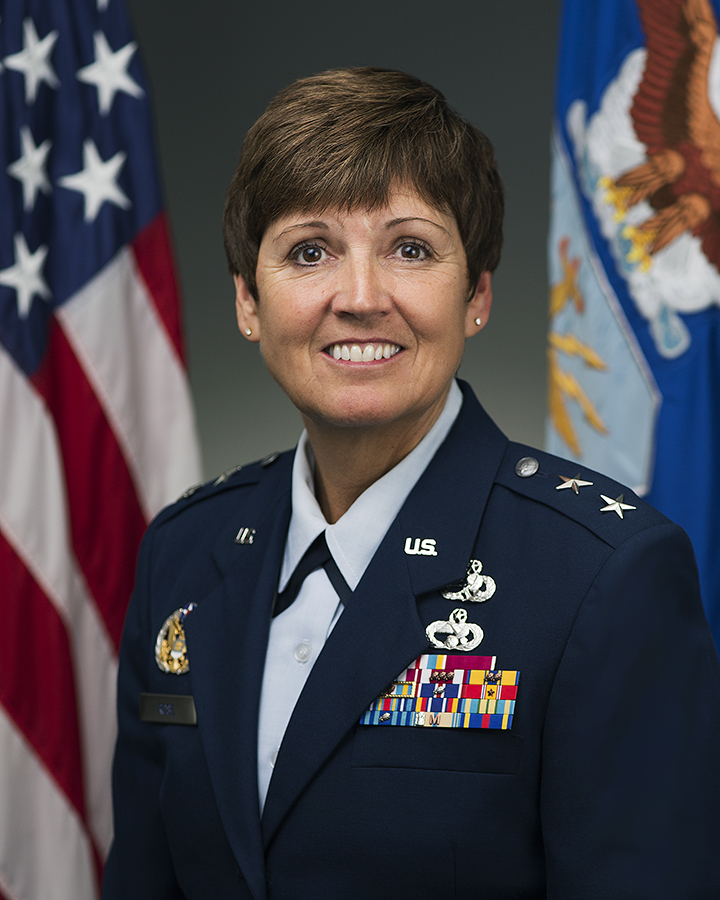
Maj Gen Patricia Rose
Out and Proud Military Top Officer
The American Military Partner
Association (AMPA), the nation’s largest
organization of lesbian, gay, bisexual,
transgender, and queer (LGBTQ) military
families, announced that Maj. Gen.
Patricia “Trish” A. Rose, the highest
ranking openly LGBTQ service member in
the US military, was honored at the
inaugural AMPA West Coast Gala on
September 17, 2016, in San Diego, CA.
The event celebrated the five-year
anniversary of the end of “Don’t Ask,
Don’t Tell” (DADT) and the end to the
military’s ban on open service by
transgender people.
“We were thrilled to welcome Major
General Rose and her wife to our
spectacular evening celebrating our
incredible progress together as a
community,” said AMPA President Ashley
Broadway-Mack. “As an out and proud
lesbian, Major General Rose’s exemplary
leadership has helped to break down
barriers and tear down walls that stood
in the way of progress. She is an
inspiration to thousands of LGBTQ
service members in every branch of our
nation’s Armed Forces."
Maj. Gen. Rose serves in the Air Force
Reserve and is the Mobilization
Assistant to the Deputy Chief of Staff
for Logistics, Engineering and Force
Protection, Headquarters US Air Force,
Washington, DC. She supports the Deputy
Chief of Staff in leadership, management
and integration of Air Force logistics
readiness, aircraft and missile
maintenance, civil engineering and
security forces, as well as setting
policy and preparing budget estimates
that reflect enhancements to
productivity, combat readiness and
quality of life for Air Force members.
General Rose entered the Air Force
through Officer Training School in 1984.
Her more notable assignments include
Mobilization Assistant to the Director
for Logistics, Engineering, and Security
Assistance, US Pacific Command and
Mission Director for the U.S. Central
Command Deployment and Distribution
Operations Center in Southwest Asia,
where she directed joint logistics for
operations Iraqi Freedom and Enduring
Freedom.
General Rose lives with her wife, Jules,
outside of Seattle, Washington, where
she also works for the Naval Hospital
Oak Harbor.
Maj Gen Patricia Rose: Highest Ranking LGBTQ Member of
US Military
Biographical Notes: Patricia Rose
Lesbian Promoted to Rank of Major
General

Gay Secretary of the Army
Eric Fanning made history on May 17,
2016 when confirmed by the US Senate as
Secretary of the Army. The confirmation
of the country’s first out gay man, Eric
Fanning, as US Army Secretary is one
sign of the progress that has been made
since “don’t ask, don’t tell.”
The Clinton-era policy became law in
1994 and lasted all the way until 2011,
finally letting service members be out
as gay or lesbian. Now the civilian
leading the Army is gay himself.
Human Rights Campaign president Chad
Griffin called the confirmation “a
demonstration of the continued progress
towards fairness and equality in our
nation’s armed forces.”
“Secretary Fanning’s historic
confirmation demonstrates that in
America, we value hard work, talent and
dedication,” said Rep. Kyrsten Sinema,
who is co-chair of the LGBTQ Equality
Caucus. “The capacity in which any
individual can faithfully serve our
country should not be limited.”
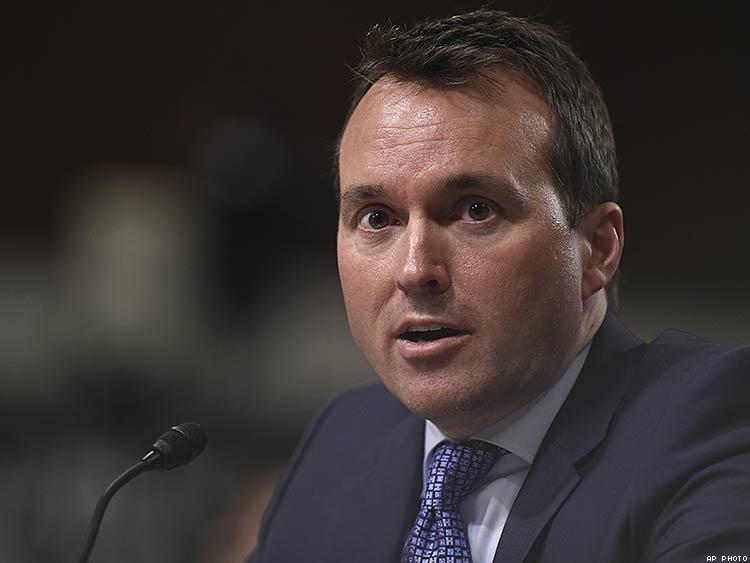
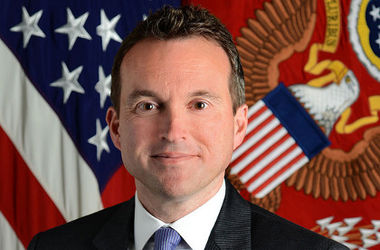
Senate Confirms First Openly Gay Army
Secretary
Advocate Magazine: Gay Man Now Runs the
US Army
Huffington Post: Senate Confirms First
Openly Gay Army Secretary
Progress has sometimes seemed swift.
Less than a year after DADT’s repeal,
the US Army got its first-ever out
brigadier general in former colonel
Tammy Smith, who received her stars from
her wife during a ceremony in 2012.
And Fanning’s confirmation itself was
notable for completely lacking any
discussion of his sexual orientation. He
is now the first out man to oversee the
US Army or any military branch. Still,
not a single senator asked him about it
during his confirmation hearing before
the Armed Services Committee, led by
former DADT proponent John McCain of
Arizona.
Fanning has 25 years of national
security experience, working as
undersecretary and acting secretary of
the US Air Force. No one seemed to
question his qualifications.
[Source: Advocate Magazine]
Policies Concerning LGBTQ Members of the Military
LGBTQ Vets Discharged Dishonorably for Sexual Orientation to get Full Benefits
LGBTQ Service Members: Out and Proud
TED Talk: Gays in the Military
What It's Like to Be Gay in the Military
Biden Reverses Trump's Transgender Military Ban
Why We Need Trans People in the US Military
Jody Davis: Veteran,
Nurse, Transgender
Marine Corps Celebrates Pride, Puts Down Homophobes
President Biden Overturns
Ban on Transgender Military Personnel
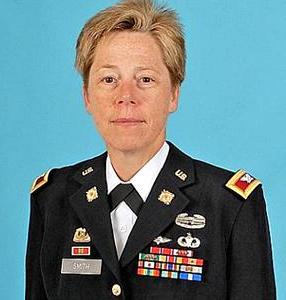
First Lesbian General Officer
Nothing has changed... Everything has
changed...
In August 2012, less
than a year after the repeal of "don't
ask, don't tell," former Army Colonel
Tammy Smith was promoted to brigadier
general making her the first general
officer to come out while serving.
Tammy Smith received her stars from her
wife Tracey Hepner in a private ceremony
at the Women’s Memorial at Arlington
National Cemetery.
According to the Stars & Stripes
military newspaper, Smith, 49, has been
assigned as deputy chief at the Office
of the Chief at the Army Reserve. Before
"don't ask, don't tell" was repealed,
she told the military newspaper last
year that she was not planning on coming
out to her colleagues, but would be
relieved when she and Hepner would be
able to go out together without worrying
about being outed.
“Finally my partner and I will be able
to go out and have drinks together
without worrying,” she said then.
A year later, Smith, 49, said she is
still more focused on the work ahead
than the significance of her personal
life. But her wife, Tracey Hepner, said
the last year has been a dramatic
transformation for both of them. “The
support we’ve received has been
amazing,” she said. "I wasn’t surprised
that people were so accepting, but in
some cases it has been even celebratory.
It’s like nothing has really changed for
us, and yet everything has changed."
Smith’s wife is much more of an activist than she is. Hepner co-founded the Military Partners and Families Coalition, a key voice in the debate over benefits and military programs for same-sex partners. Friday’s private promotion ceremony for Smith wasn’t the first that Hepner has attended, but it was the first where the pair didn’t have to hide any details of their relationship. The pair have been together for more than a decade.
Advocate Mag: Tammy Smith Becomes First Lesbian Genl Officer
Stars & Stripes: Smith Becomes First Gay Genl Officer to Serve Openly
Lesbian Earns Major General Rank
Obama Appoints Gay Man as Undersecretary of Air Force
US Navy First Official Gay Homecoming Kiss
"It's nice to be able to be myself."
-Marissa Gaeta,
US Navy
On December 21, 2011, when the USS Oak Hill pulled into its Virginia port after a three-month deployment, the
US Navy sailor who stepped off and bestowed the customary first homecoming kiss on a waiting loved one made history. Petty Officer 2nd Class Marissa Gaeta greeted her girlfriend, Citlalic Snell, on the pier with a kiss and embrace, making them the first same-sex couple to be chosen by the Navy for this very public moment. The crowd cheered.
The kiss seen 'round the world between
two women sailors was more than a
traditional kiss marking a Navy ship's
return home. It was a small but
significant sign of progress in the US
military. The repeal of the “don’t ask,
don’t tell” policy is less than a year
old. Gaeta and her girlfriend (who is
also a sailor) could not have kissed so
publicly at a homecoming a year ago.
Gaeta won the “first kiss” spot in a
raffle among the crew.
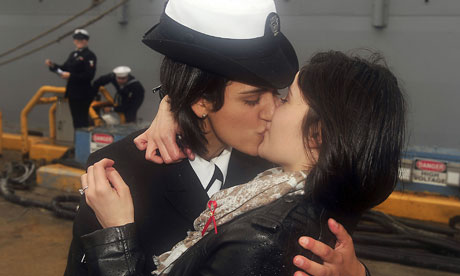
Life After DADT
Military Academy Graduates First Openly Gay Cadets
Same Sex Wedding at West Point
It's been three months since the dock
landing ship left home for Central
America, and all of the usual fanfare is
waiting to greet its crew: crowds of
cheering families, toddlers dressed in
sailor suits, and the lucky, excited
woman who's been chosen to take part in
a time-honored Navy tradition - the
first homecoming kiss. In this case,
that woman is 22-year-old Citlalic
Snell. She's a sailor herself, assigned
to the destroyer Bainbridge, but today
she's in civilian clothes - jeans, boots
and a stylish leather jacket. Watching
pierside as the Oak Hill pulls into
port, she absentmindedly twists the
small diamond ring on her left hand.
A uniformed liaison who is with her
explains how it's going to work: Snell's
sailor will be among the first off the
ship, and when it's time, Snell will be
escorted onto the pier for the kiss.
"It's a big deal," Gaeta says. "It's
been a long time coming." They explain
that they've been dating for a little
over two years, about as long as they've
been in the US Navy. They met right
after boot camp. They were roommates at
their first training school, where they
both became fire controlmen. Until
September 2011, when the military's ban
on openly gay service was lifted, they
worked hard to keep their relationship
secret. When Snell came home from her
last deployment in August, kissing on
the pier wasn't an option. "This is the
first time we can actually show who we
are," she says. Adds Gaeta, "It's nice
to be able to be myself."
Army Guy's Coming Out Story
Modern Military Association of America
First Black Female Gay Soldier to Pass Ranger School
Trans Service Members Make
Public Statement at VMA Event Military Academy Graduates First Openly Gay Cadets
Same Sex Wedding at West Point
Transgender Video Documentary: At War and In Love
Maj Gen Patricia Rose: Highest Ranking LGBTQ Member of
US Military
New Normal: Gay Interracial Military Weddings I Was Called a Faggot My First Day in the Army
First Active-Duty Gay Couple Married at West Point
Gay Soldier Berated in Restaurant
USMC First Official Gay Homecoming Kiss
In February 2012, when he returned from
Afghanistan and saw his partner waiting
to welcome him home, "four years of
pent-up emotion and secret love" just
seemed to naturally lead to "what felt
like an eternity kiss," said Marine Sgt.
Brandon Morgan. "I looked to my left"
and saw Dalan Wells, his partner, Morgan
said. "My legs started going numb ...
and I didn't care who was around. ... I
wanted to show him how much I cared for
him." They've known each other for four
years.
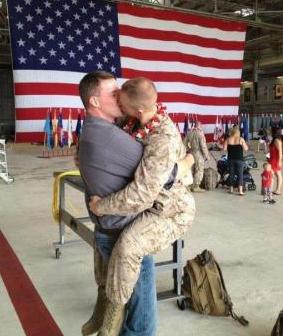
And the post-kiss reaction sparked by
the posting of their photo on the
internet has made him "very hopeful,"
Morgan said, "because even though
there's been a lot of negative
responses, the positive responses have
been overwhelming." The "don't ask,
don't tell" policy that had barred
openly gay men and women from serving in
the US military ended in September
2011.
Military
One Source
LGBTQ in the Military: A Brief
History, Current Policies and Safety
How the Military Supports Diversity and Inclusion
Child and Youth Behavioral Military and Family Life
Counselors
Sexual Orientation and Gender Identity in Military
Service
LGBTQ Healthcare in US Veterans Health Administration
Research: LGBTQ and Health
Related Behaviors in US Military
Lesbian Earns Major General Rank
Obama Appoints Gay Man as Undersecretary
of Air Force
11 Major Milestones After the End of
DADT
End of DADT Means Decision Time for Gay
Troops
Why We Need Trans People in the US Military
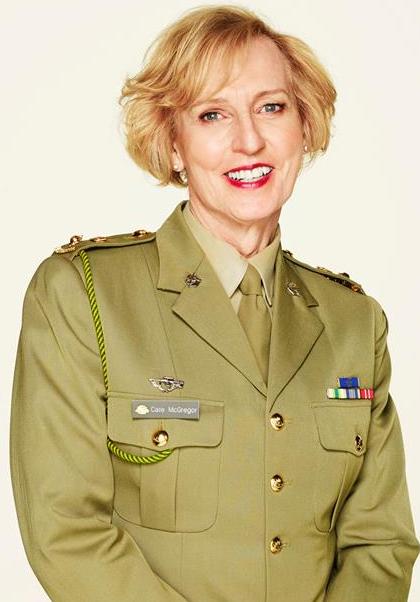 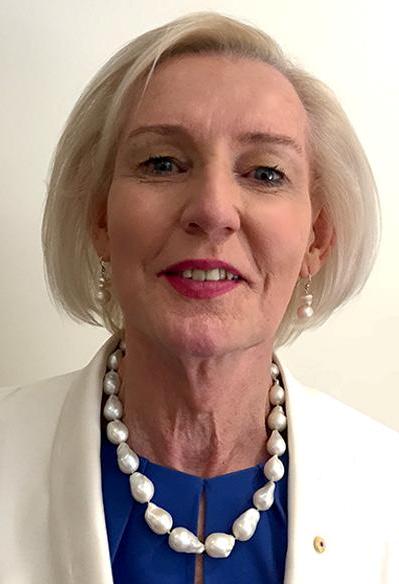
Transgender Australian Military Officer
Captain
Catherine McGregor is a transgender writer, activist,
and cricket player who served as a member of the
Australian Defense Force. In 2012, McGregor was
appointed a Member of the Order of Australia in the
Military Division for "exceptional service to the
Australian Army as the Director of the Land Warfare
Studies Centre".
In 2013, Chief of Army, Lieutenant General David
Morrison refused to accept her resignation when she went
public as transgender. McGregor was the highest ranking
transgender person in the Army, and the speechwriter and
strategic adviser for David Morrison. McGregor
transferred to the Royal Australian Air Force in 2014 to
work on projects for the Chief of Air Force.
In 2015 McGregor, in considering having gender
reassignment surgery said, "it’s about being congruent
in your identity. I would like to feel whole," and that
any sex change, "will be funded independently with no
taxpayer assistance".
Cate McGregor Interview: Transgender Life
Panel Discussion with Cate McGregor: Coming Out Trans
Video Profile: Cate McGregor
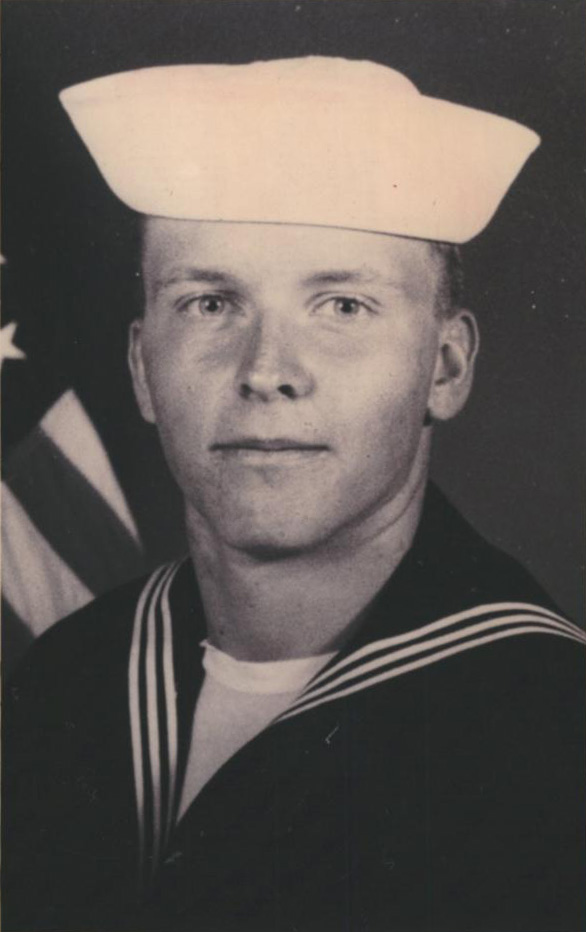
Allen Schindler: Brutal Murder
Allen R. Schindler Jr. (1969 – 1992) was
a US Navy petty officer who was brutally
beaten to death because he was gay. His
murder was cited by President Bill
Clinton and others in the debate about
gays in the military that culminated in
the “don’t ask, don’t tell” policy.
Schindler was killed in a public toilet
in Japan by Terry Helvey, who acted with
the aid of an accomplice, Charles Vins,
in what Esquire called a "brutal
murder." At first the Navy tried to
cover up the circumstances of
Schindler’s death.
The events surrounding Schindler's
murder were the subject of a CBS 20/20
episode and were portrayed in the TV
film ‘Any Mother's Son’ in 1997. In 1998
the film won a GLAAD Media Award for
Outstanding Made for TV Movie.
According to several of his friends,
Schindler had complained repeatedly of
anti-gay harassment to his chain of
command in March and April 1992, citing
incidents such as the gluing-shut of his
locker and frequent comments from
shipmates such as "There's a faggot on
this ship and he should die."
Schindler had begun the separation
process to leave the Navy, but his
superiors insisted he remain on his ship
until the process was finished. Though
he knew his safety was at risk,
Schindler obeyed orders.
Airman Apprentice Terry M. Helvey, who
was a member of the ship's weather
department, stomped Schindler to death
in a toilet in a park in Nagasaki. A key
witness saw Helvey jump on Schindler's
body while singing, and blood was
gushing from Schindler's mouth as he
attempted to breathe.
Schindler was left lying on the bathroom
floor until the Shore Patrol and the key
witness to the incident carried out
Schindler's body to the nearby
Albuquerque Bridge. Schindler had "at
least four fatal injuries to the head,
chest, and abdomen," his head was
crushed, ribs broken, and his penis cut,
and he had "sneaker-tread marks stamped
on his forehead and chest", destroying
every organ in his body, leaving behind
a "nearly unrecognizable corpse.”
The key witness was requested to explain
in detail to the military court what the
crime scene looked like, but would not
because Schindler's mother and sister
were present in the courtroom. His
family was only able to identify him by
the tattoo on his arm.
The Navy was less than forthcoming about
the details of the killing, both to the
news media and to the victim's family,
especially his mother, Dorothy Hajdys.
Navy Officials failed to include in his
belongings the log book Allen kept of
his time on board and his record of his
harassment.
In the wake of Schindler's murder, the
Navy denied that it had received any
complaints of harassment and refused to
speak publicly about the case or to
release the Japanese police report on
the murder.
During the trial Helvey denied that he
killed Schindler because he was gay,
stating, "I did not attack him because
he was homosexual." However, evidence
presented from the interrogation of
Helvey the day after the murder, showed
that he said he hated homosexuals and
was disgusted by them. On killing
Schindler Helvey said: "I don't regret
it. I'd do it again. He deserved it."
Under a court-approved bargain in
exchange for his pleading guilty to
"inflicting great bodily harm" Helvey is
serving a life sentence, rather than
facing the death penalty as he would
have under the original charge.After the
trial Douglas J. Bradt, the captain who
kept the incident quiet, was transferred
to shore duty in Florida. Helvey's
accomplice, Charles Vins, was allowed to
plea bargain as guilty to three lesser
offenses and served a 78-day sentence
before receiving a general discharge
from the Navy.
Murder of Allen R. Schindler Jr.
First Black Female Gay Soldier to Pass Ranger School
Military Academy Graduates First Openly Gay Cadets
Same Sex Wedding at West Point
New Normal: Gay Interracial Military Weddings
First Active-Duty Gay Couple Married at West Point
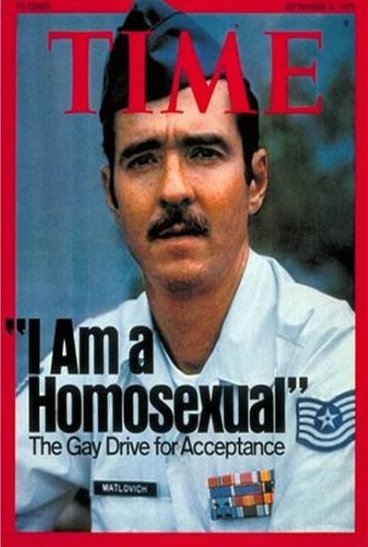
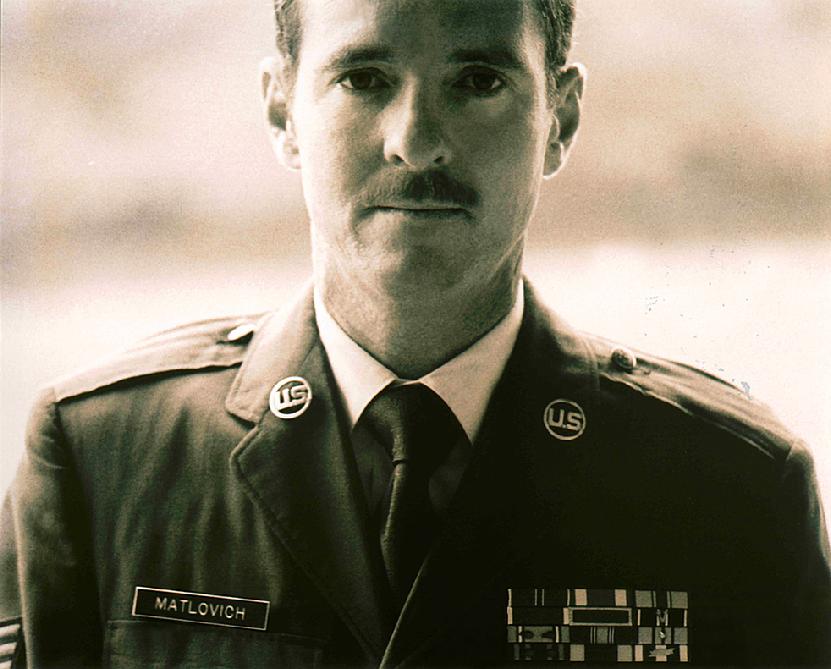
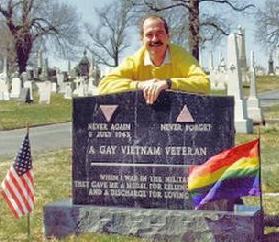
Leonard Matlovich: Improper Dismissal
In March 1975, Technical Sergeant
Leonard P. Matlovich revealed his sexual
orientation to his commanding officer
and was forcibly discharged from the US Air
Force six months later. Matlovich was a
Vietnam War veteran and was awarded the Purple Heart and the Bronze Star. In
1980, the US Court of Appeals ruled that
the dismissal was improper. Matlovich
was awarded his back pay and a
retroactive promotion. Upon his death,
the inscription on his gravestone read:
''When I was in the military they gave
me a medal for killing two men and a
discharge for loving one.''
Modern Military
Association of America
First Black Female Gay Soldier to Pass Ranger School Military Academy Graduates First Openly Gay Cadets
Transgender Video Documentary: At War
and In Love
Same Sex Wedding at West Point
TED Talk: Gays in the Military
New Normal: Gay Interracial Military Weddings
First Active-Duty Gay Couple Married at West Point
Info: LGBTQ Police Officers and Firefighters
What It's Like to Be Gay in the Military
Army Guy's Coming Out Story

HOME
QUEER CAFE
│ LGBTQ Information Network │ Established 2017
|